Chapter 12
The Galilean Campaign
The Great Revolt Begins
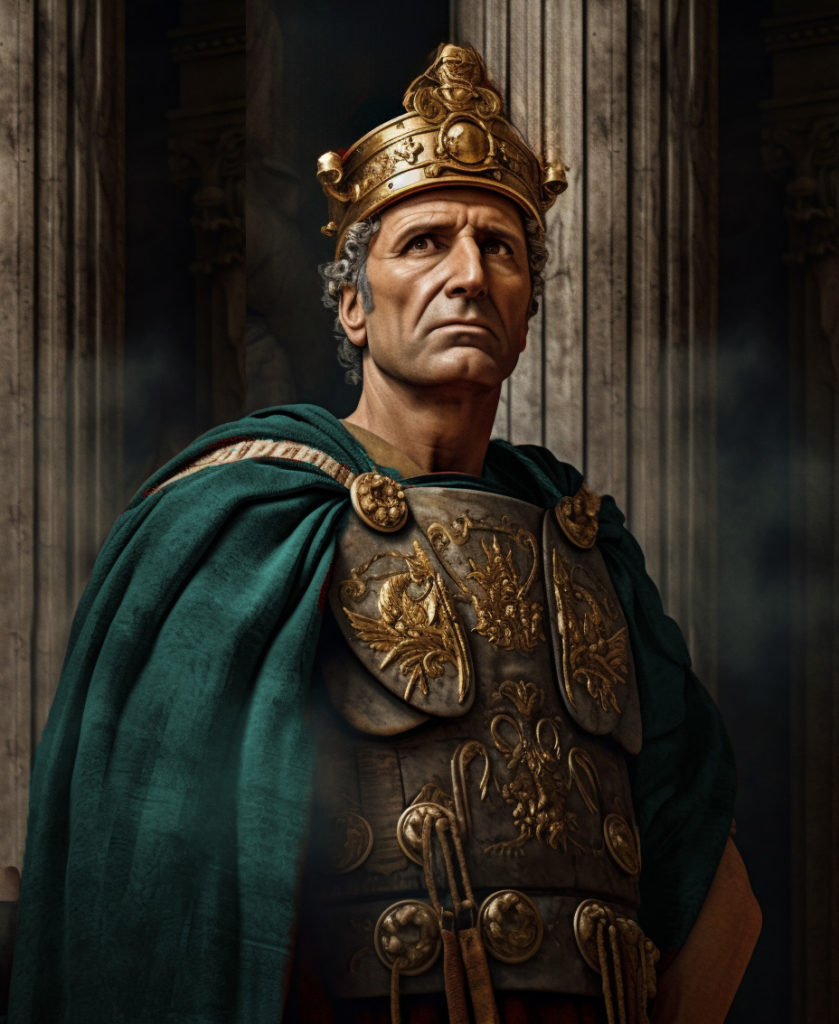
King Agrippa II now returned from a trip to Egypt and assessed the situation. Those whose family members had been killed in the marketplace came to him, begging him and the chief priests to send a delegation to Nero concerning the barbarity of Florus. But whatever initial pity the king felt for the people had turned to anger, for he was convinced that their actions proved they were determined to start a war against Rome.1Beasley, B. (2015). Flavius Josephus: The Jewish Wars. Living Stone Books.
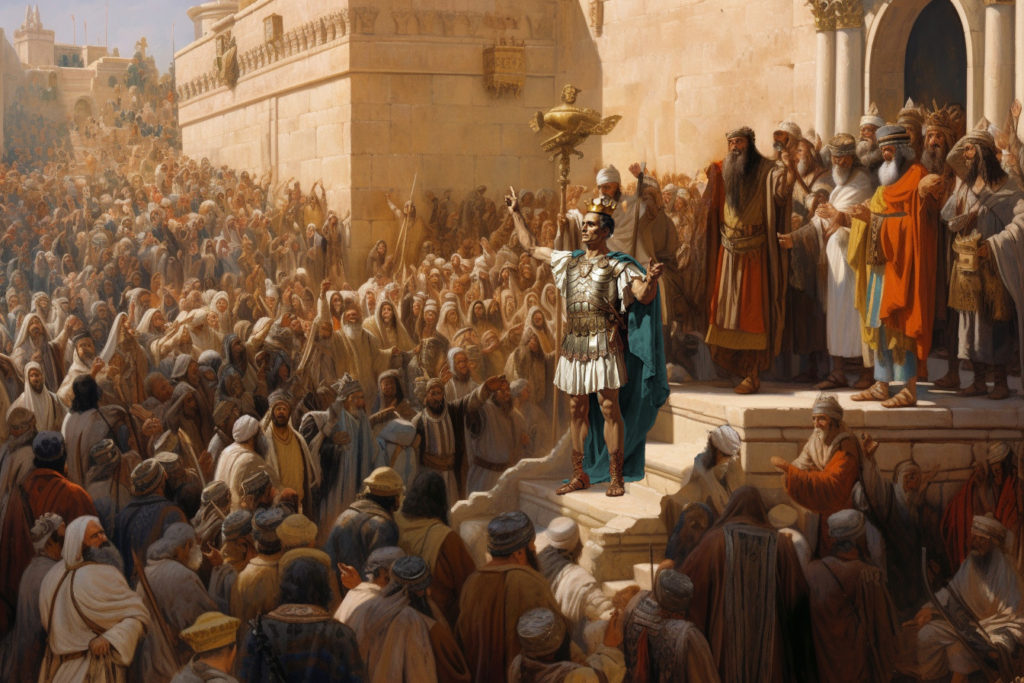
Rather than offer his assistance, he hectored the assembled crowd, telling them they must always show their submissiveness to those in authority, not provoke them in any way, and bear unjust afflictions without complaint. He told them that if their forefathers had not wanted to lose their national liberty, they should have never allowed Pompey to enter Jerusalem a hundred years before. While the once-free and mighty Gauls, Germans, Britons, Greeks, Carthaginians, and Egyptians had all eventually submitted to Rome and accepted their fate, only the Jews were aggrieved over their plight. And whereas all these nations had powerful militaries, with what army did the Jews even expect to wage war? They might as well just murder their own women and children and be done with it, he scolded.2Beasley, B. (2015). Flavius Josephus: The Jewish Wars. Living Stone Books.

At this, the crowd became unruly and began shouting insults at the king. They had Agrippa II thrown out of the city, and some threw stones at him to drive him away. Then a zealous young Temple captain named Eleazar, who was the son of the high priest Ananias, persuaded his fellow priests to end the nation’s long standing policy of accepting sacrifices on behalf of foreigners—an accommodation which had helped foster international relations. While this may seem like a mere ceremonial gesture, the rejection of sacrifices on behalf of the empire would be taken as a crystal clear signal to Rome that the Jews were now in full open revolt.3Beasley, B. (2015). Flavius Josephus: The Jewish Wars. Living Stone Books.
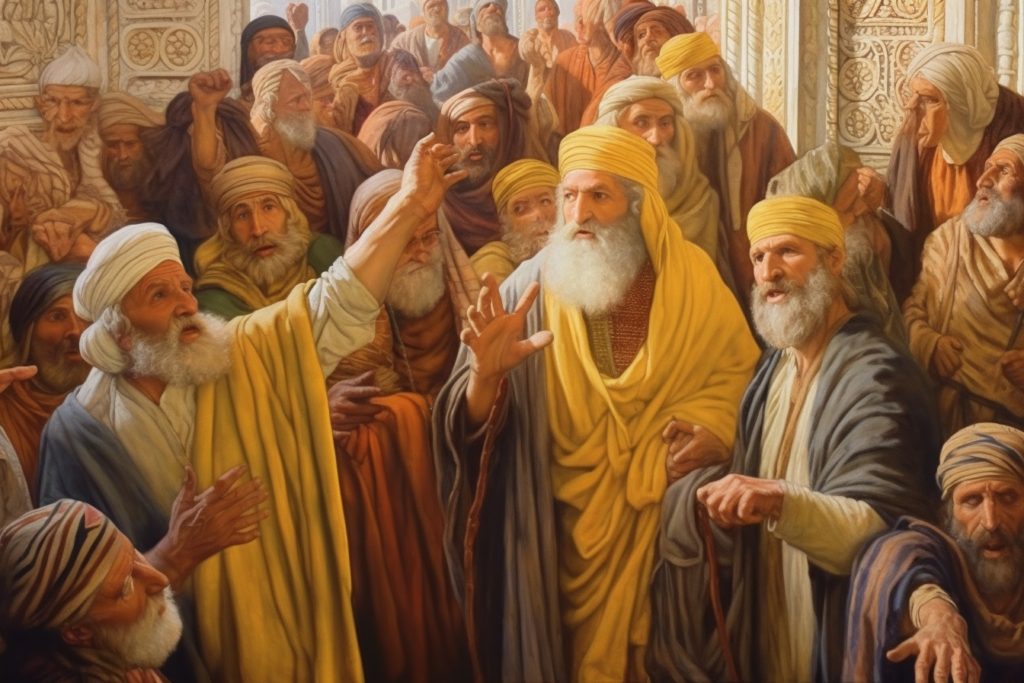
Aghast at the implications, the chief priests and the leaders of the Pharisees assembled the masses of people and tried to convince them to resume the sacrifices on behalf of foreigners before it was too late. But the determined revolutionaries paid them no mind and continued making their preparations for war. Recognizing that their attempts at persuasion were hopeless, the chief priests and Pharisees sent emissaries to both Florus and Agrippa, requesting they bring their combined forces against the insurgents to put an end to their revolt before it spiraled out of control.4Beasley, B. (2015). Flavius Josephus: The Jewish Wars. Living Stone Books. While it is difficult to determine with any certainty, it has been proposed that one of these emissaries was none other than Paul the apostle—here being referred to by a Jewish historian of the time by his Hebrew name “Saul”.5Eisenman, R.H. (1998). James the Brother of Jesus: The Key to Unlocking the Secrets of Early Christianity and the Dead Sea Scrolls. Penguin.
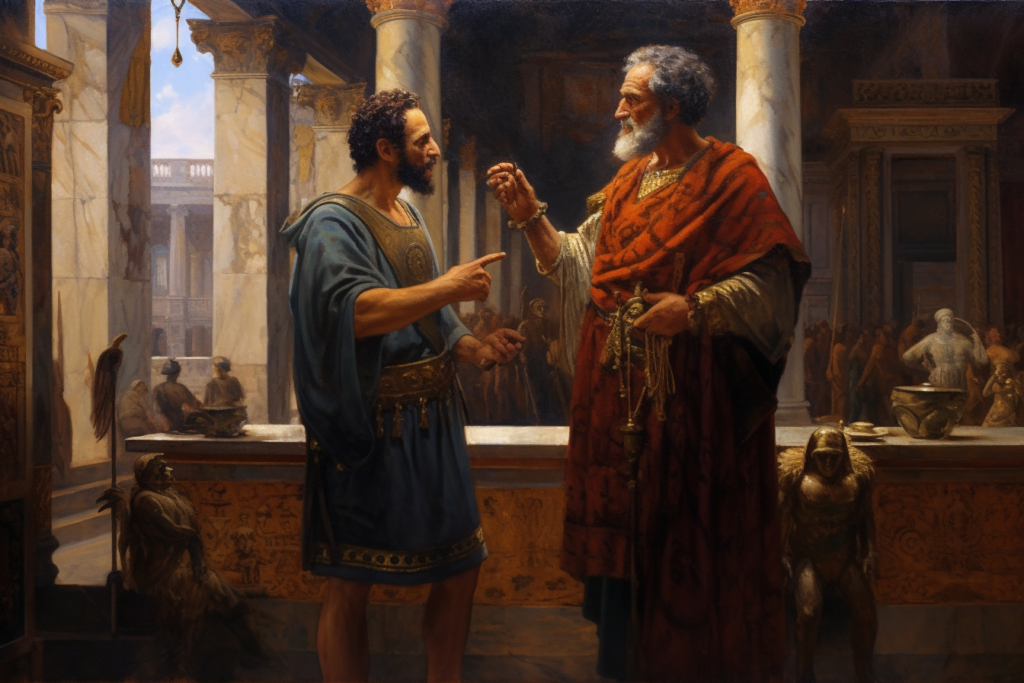
This Saul and his brother Costobarus are said by the historian to be related to King Agrippa II. Since Agrippa II is a descendant of the tyrant King Herod,6Beasley, B. (2015). Flavius Josephus: The Jewish Wars. Living Stone Books. this matches our knowledge that Paul was also of King Herod’s family. Paul, as we have seen, went out of his way to ingratiate himself among Roman aristocrats, befriending the governor Felix who had been utterly cruel to the Jews; speaking pleasantly at length with Agrippa II while under cushy house arrest in Caesarea; and becoming close with Nero’s secretary of letters Epaphroditus. The “Saul” presented by this historian, meanwhile, is close to King Agrippa II, is pro-Roman, and is vehemently against the sort of fanatical anti-Roman messianic Jews7Beasley, B. (2015). Flavius Josephus: The Jewish Wars. Living Stone Books.—like, say, James the Just and his ekklesia, or those now preparing for war.

If this identification is correct, the Jerusalem aristocracy now sent Paul and his brother to confer with their relative Agrippa II and the governor Florus. Whereas Florus ignored the emissaries completely, content to let events take their course, the king responded by gathering a large force of horsemen, sending them to drive out the rebels occupying the Temple of Jerusalem. A weeklong bloody battle ensued. Rebels in the Temple and lower city collided with the king’s cavalry who were joined by those Jews in the city loyal to the chief priests and Pharisees. But when the Sicarii joined the battle, fighting alongside the rebels, they attacked boldly, and drove their foes from the Temple precinct and the whole upper city as well. These revolutionaries then torched the high priest’s house and burned Agrippa II’s palace in Jerusalem to the ground. Then they targeted the city archives and burned all the debt records to unburden the poor.8Beasley, B. (2015). Flavius Josephus: The Jewish Wars. Living Stone Books.
Reign of The Galilean

With the revolutionaries lacking proper weapons and armor for war, a man named Menahem ben Judah, but known simply as “The Galilean”, now led a force of some of the most fervent and bold rebels out of the city, marching them to the Masada palace-fortress that King Herod had constructed by the western shore of the Dead Sea. Taken by surprise, the contingent of Roman soldiers stationed there were slaughtered. The Galilean’s men broke into the armory there, removing all manner of weaponry, armor, and supplies. He outfitted his personal bodyguards first, and then distributed the rest to as many other rebels as possible.9Beasley, B. (2015). Flavius Josephus: The Jewish Wars. Living Stone Books.

The Galilean returned to Jerusalem decked out like a king and became the de facto leader of the rebellion.10Beasley, B. (2015). Flavius Josephus: The Jewish Wars. Living Stone Books. This kingly garb is a strong tip-off that The Galilean was yet another figure who presented himself as a messiah who would miraculously save the people and usher in the End Times. Messianic fervor must also be seen as integral among the fanatical rebels and population at large, for it must have been obvious to them that without serious divine intervention, they would stand no chance at overpowering the Roman military.

The next day, the aristocrats and chief priests still in Jerusalem did their best to hide from the rebels who continued burning the houses of the rich. The brothers “Saul” and Costobarus fled with many of Agrippa II’s soldiers into a defensible palace in the upper city occupied by Roman soldiers. The rebels found themselves unable to set the building on fire, as every time they approached, the soldiers rained down darts from above. Instead, therefore, they dug a tunnel from a distance, and when they were underneath one of the towers, they set it on fire from underneath. The tower collapsed, and the rebels rushed in only to find themselves stopped in their tracks by another wall the defenders had hastily constructed. But knowing this wouldn’t save them for long, those inside sought terms of surrender.11Beasley, B. (2015). Flavius Josephus: The Jewish Wars. Living Stone Books.
The Galilean was overseeing the siege of the palace, and decided to allow all of Agrippa II’s soldiers—their fellow Jews—to go free. The remaining Romans soldiers were now greatly outnumbered, but knew what fate would await them if they surrendered, so they made a hurried retreat back into the palace. Many were struck down as they attempted to shut themselves in the remaining towers. “Saul” and his brother Costobarus must have been allowed to escape, seeing as they were not Roman soldiers, and, as we will see, they play one more decisive role in history.12Beasley, B. (2015). Flavius Josephus: The Jewish Wars. Living Stone Books.
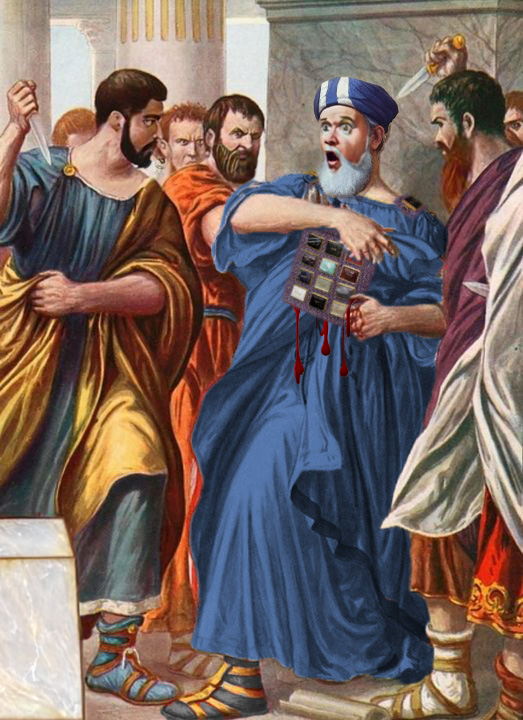
The news arrived the next day that the Galilean’s men had discovered the high priest Ananias and his brother hiding in an aqueduct, and they executed them both. When the other early revolutionary leader Eleazar learned what had happened to his father and uncle, he gathered a throng of rebels loyal to him and sought to take vengeance on The Galilean. They found him in his royal regalia worshiping at the Temple surrounded by his bodyguards. The crowd threw stones at them. Some were executed on the spot while others fled and were hunted down. The Galilean was eventually found hiding in the old part of the city. He was dragged out, tortured in various ways, and executed.13Beasley, B. (2015). Flavius Josephus: The Jewish Wars. Living Stone Books.
The Roman soldiers still besieged in the palace had now grown desperate. Their captain Metilius proposed that they would lay down all their arms if allowed to leave the building and escape. The rebels’ policy had been to only allow their fellow Jews to go free, so they offered the Romans the opportunity to convert and become circumcised. Only Metilius took them up on this proposal and was circumcised while the rest of the soldiers were slaughtered.14Beasley, B. (2015). Flavius Josephus: The Jewish Wars. Living Stone Books.
Roman Legion Defeated
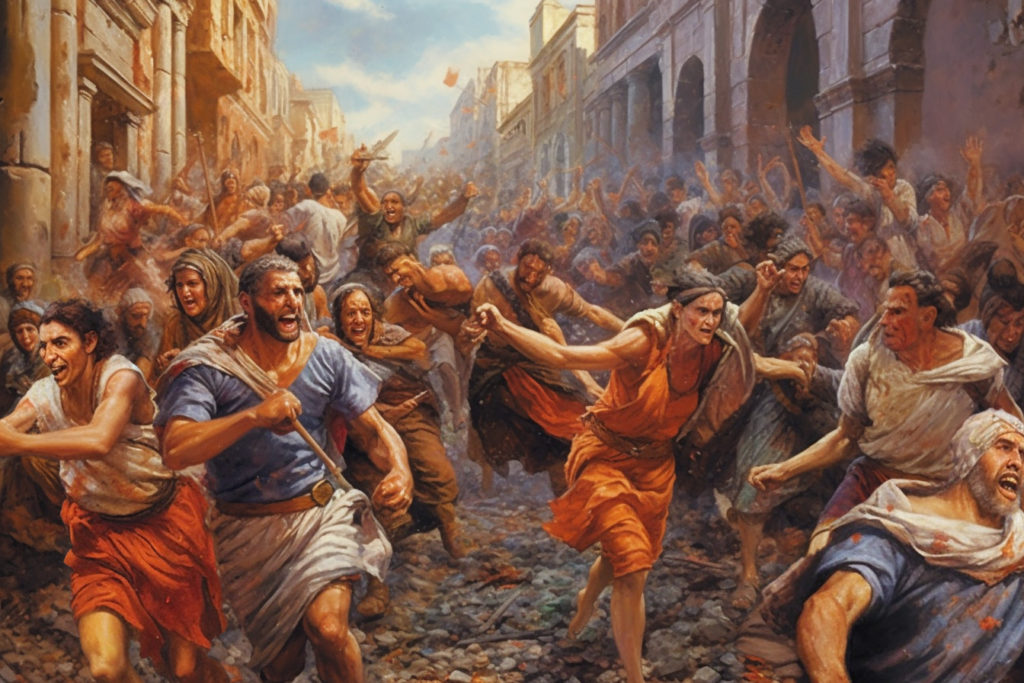
Hearing of the atrocities committed by the Jews in Jerusalem, the Gentile population of Caesarea now rose up and carried out a pogrom, attempting to preemptively murder the thousands of Jews living there. Governor Florus was still residing at his palace in the city, and participated by rounding up any Jews who fled and forcing them into galley slavery. The rebel Jews responded by heading to many of the nearby Gentile villages and towns to take revenge. Major cities in Galilee, Syria, and Lebanon with mixed populations also saw many Jews rounded up, slaughtered, banished, or thrown in prison. In Egypt, the Gentiles of Alexandria resumed their sporadic persecutions of the minority Jewish population. When three Jews were burned alive by a Gentile mob, a major riot broke out. The governor, placing the blame for the violence entirely on the Jews, sent his soldiers door-to-door to massacre thousands of Jews—men, women, and children. In Damascus in Syria, the men of the city were afraid to attack the Jews openly because many of their wives had converted to Judaism. So instead they ambushed them by night, slitting their throats.15Beasley, B. (2015). Flavius Josephus: The Jewish Wars. Living Stone Books.

In September of 66 CE, the Roman governor of Syria Cestius Gallus and the ruler of the neighboring land King Agrippa II, formed a combined army that would be sure to crush the rebellion before the situation got any worse. The rebels, for their part, were hurrying to take control of the various strategic fortresses all around Judah.16Beasley, B. (2015). Flavius Josephus: The Jewish Wars. Living Stone Books.
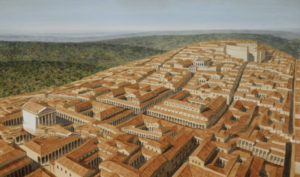
Just a short distance from what is today identified as the village of Nazareth stood Galilee’s largest population center, the Greek-style city of Sepphoris. Its largely Gentile population welcomed Gallus’s forces as they secured the city before moving on. While traveling through the nearby highlands, the Roman troops were set upon by a rebel force that threw hundreds of darts down on them from cliffs above, killing many. But the expertly trained troops regrouped and marched up the rock formations and slaughtered nearly all the poorly-armored revolutionary attackers.17Beasley, B. (2015). Flavius Josephus: The Jewish Wars. Living Stone Books.
In Jerusalem, it was now the Feast of Tabernacles, and massive crowds had come to celebrate this festival and their newly declared freedom. But when news came of Gallus and Agrippa II’s approaching armies, as many as were able took up arms. At a strategic narrow mountain pass called Beth Horon six miles outside the city, they met the Roman forces head on.18Beasley, B. (2015). Flavius Josephus: The Jewish Wars. Living Stone Books.

A man named Niger of Perea led the charge along with Queen Helena of Adiabene’s grandsons Monobazus and Kenedeus, fearlessly barreling into the enemy’s frontlines on horseback, breaking their formation, and killing hundreds of their troops. But the Romans had held their cavalry and additional soldiers in reserve, and they managed to nearly surround the Jews, forcing them to retreat. Hailed as heroic martyrs of the cause, both Monobazus and Kenedeus perished in the combat.19Beasley, B. (2015). Flavius Josephus: The Jewish Wars. Living Stone Books.
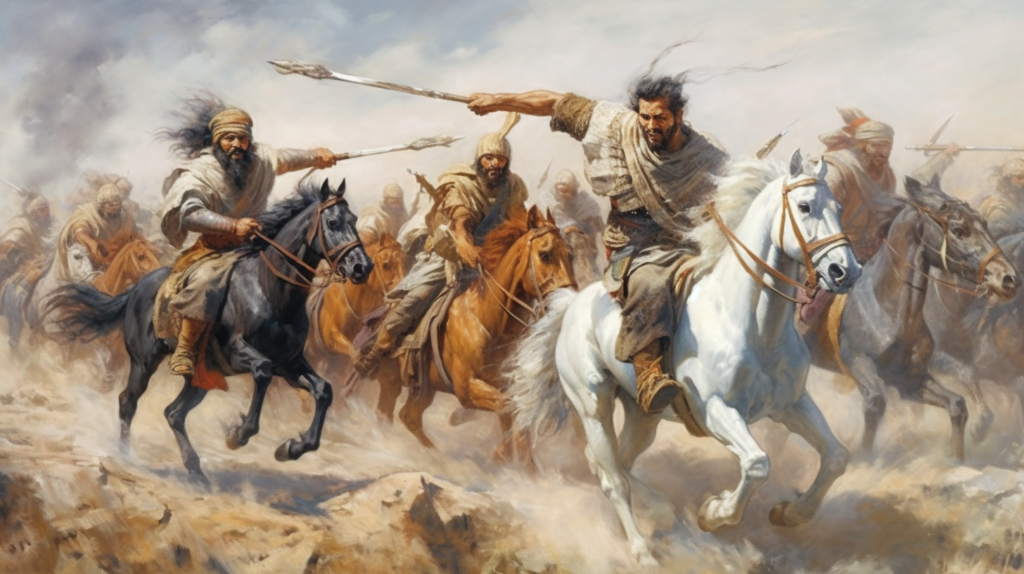
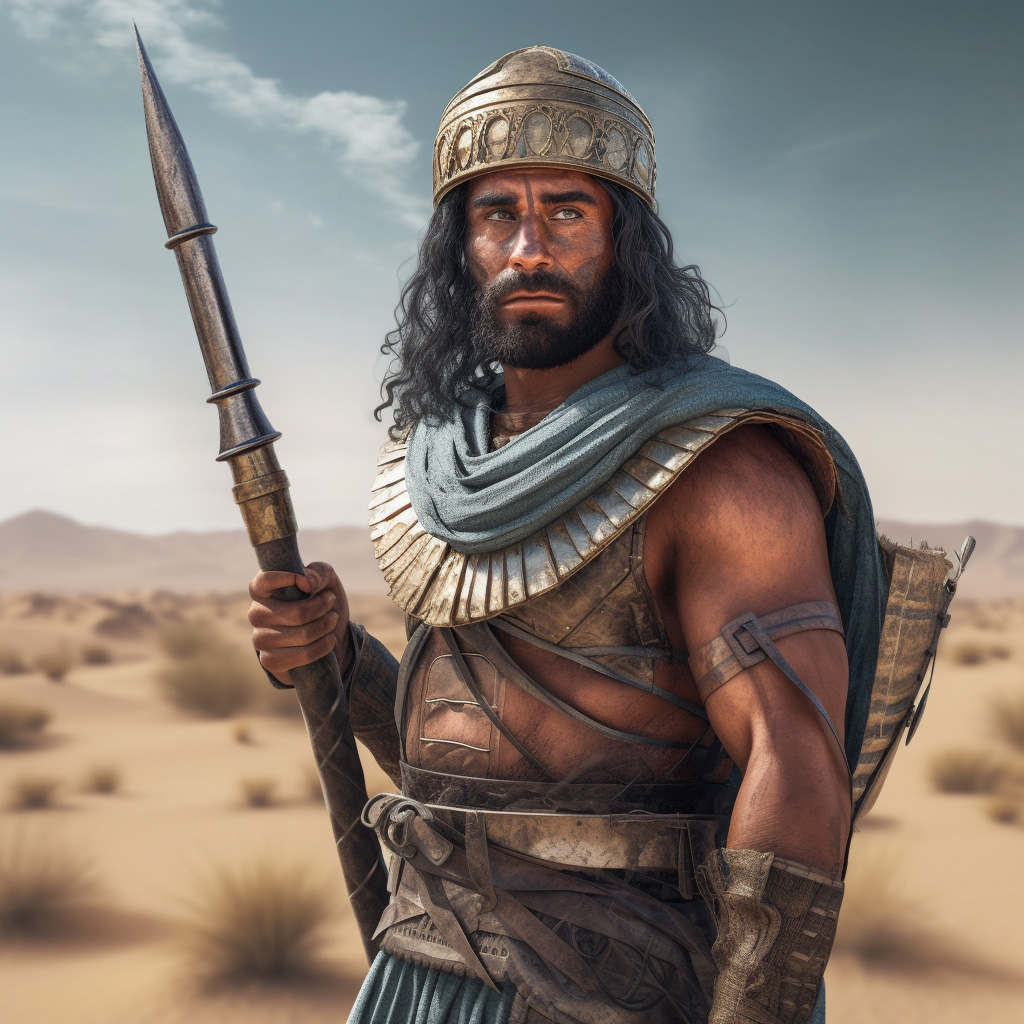
Another rebel leader named Simon Bar-Giora led a force around the still-approaching enemy and attacked them from behind, causing them to panic. He thereby took hold of a great number of their beasts of burden and war supplies. The Jews had soon taken control of all the heights surrounding Jerusalem, and Agrippa II realized his army might not be safe. He decided to negotiate with the rebels, hoping to win over any moderates among them. He sent two of his men best-known to the Jews, Bocreus and Phebus, to announce that the Syrian governor Gallus was willing to issue pardons to any rebels who came over to their side. The more determined rebels, fearing that some might be persuaded to abandon the revolution, killed Phebus before he could utter a word, while a wounded Borceus ran back to his army. Some of the Jews in the city were extremely upset with the rebels who had done this, and so murdered them.20Beasley, B. (2015). Flavius Josephus: The Jewish Wars. Living Stone Books.
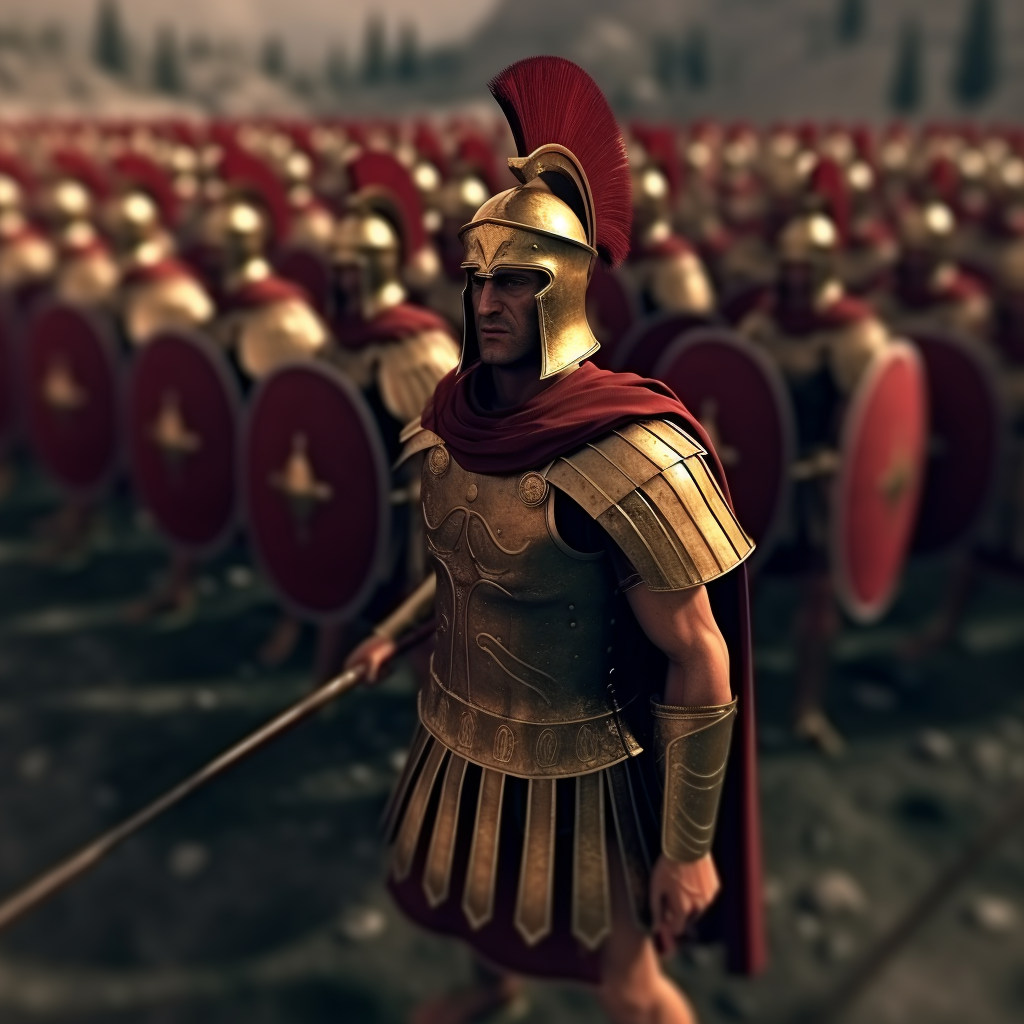
Days later, Gallus’s army managed to penetrate their way into the outer city, setting fire to some of the suburban districts there, and setting up camp outside the royal palace. The rebels retreated into the more defensible inner city and the Temple complex for safety. For the next five days, Gallus’s men attempted to climb the walls into the inner city but were persistently repulsed by hails of darts tossed at them from above. The Romans tried closing their ranks with shields held overhead in an attempt to burn down one of the gates of the inner city wall, but were unsuccessful. At this point, Gallus ordered his men to halt their attack, and he marched them out of the city. The rebels, elated that they had fended off a Roman legion, followed-up on their victory by chasing Gallus’s slow, equipment-laden army as it marched back toward the coast. Many of their soldiers were felled with projectiles and much of their supplies were plundered.21Beasley, B. (2015). Flavius Josephus: The Jewish Wars. Living Stone Books.
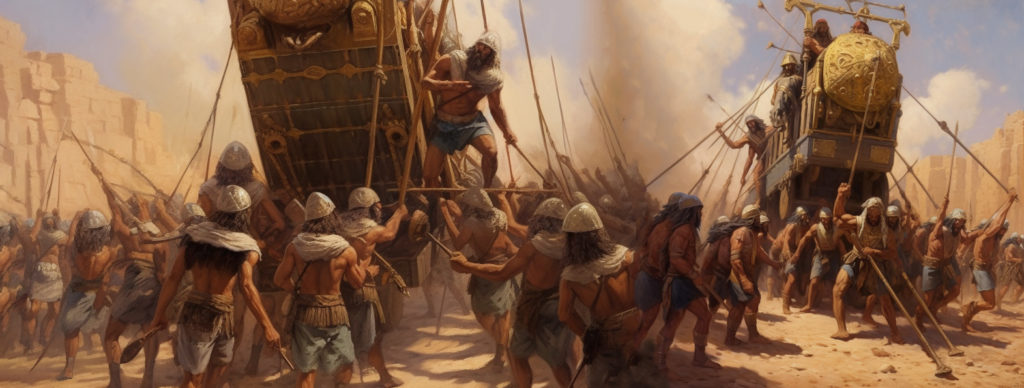
Seeing the success of their tactics, the rebels continued harassing Gallus and his army at every opportunity. Taking advantage of the terrain to attack from above or when their horsemen could not maneuver, they did great damage. Exhausted, the Romans were forced to stop for the night at a mountain pass. When morning came, the Jews saw that it had been a ruse. Only a few hundred of Gallus’s men had stayed the night, while the rest escaped. The angered rebels now greatly outnumbered the remaining troops, and slaughtered them. Gallus’s main army was now too far ahead to catch up with, but to ensure their successful escape they had left behind greatly valuable catapults, siege engines, and other war machinery.22Beasley, B. (2015). Flavius Josephus: The Jewish Wars. Living Stone Books.

The rebels sang songs as they marched back to the holy city. So far, they had suffered few casualties while killing thousands of Roman soldiers and hundreds of cavalry.23Beasley, B. (2015). Flavius Josephus: The Jewish Wars. Living Stone Books. Even if the messiah and his angels had not yet materialized to join them in battle, it must have felt that God was on their side.
The Rebels Organize
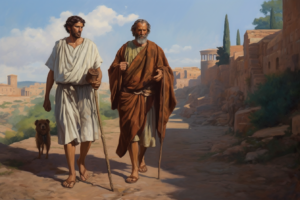
“Saul” and Costobarus now fled Jerusalem—along with many others who did not favor revolution—and traveled to Caesarea on the coast to meet with Gallus. The defeated governor decided to send the brothers as ambassadors to Nero, instructing them to incite the emperor’s anger against Florus rather than himself. At this time, the emperor was in temporary residence at Corinth in Greece, home to one of the apostle Paul’s largest communities of believers. There the emperor was overseeing an ultimately doomed attempt to carve a canal out of rock in order to connect the seas to the east and west of central Greece at a point where they were separated by a narrow isthmus24Beasley, B. (2015). Flavius Josephus: The Jewish Wars. Living Stone Books.—a project that would not meet with success until tried again in the modern era.
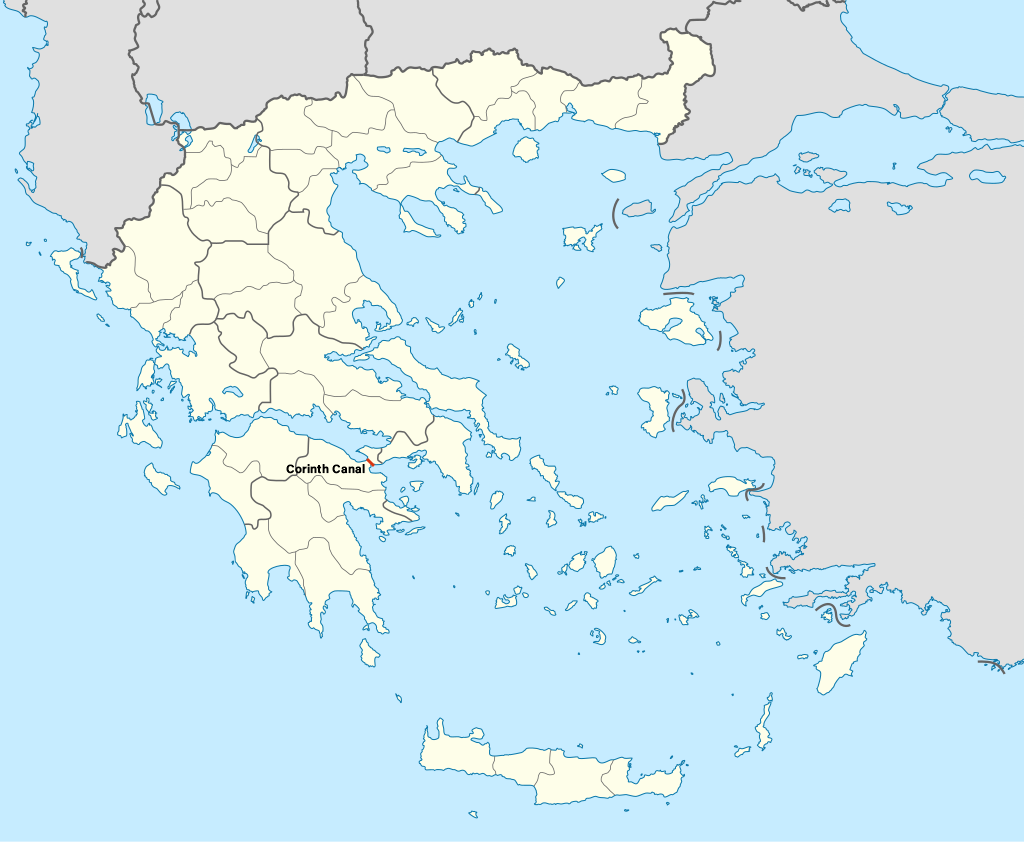
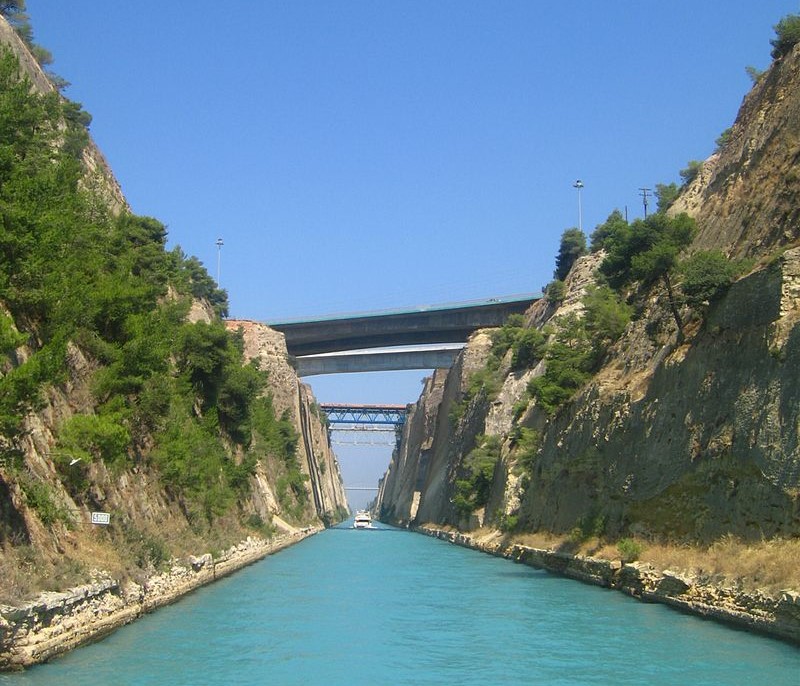
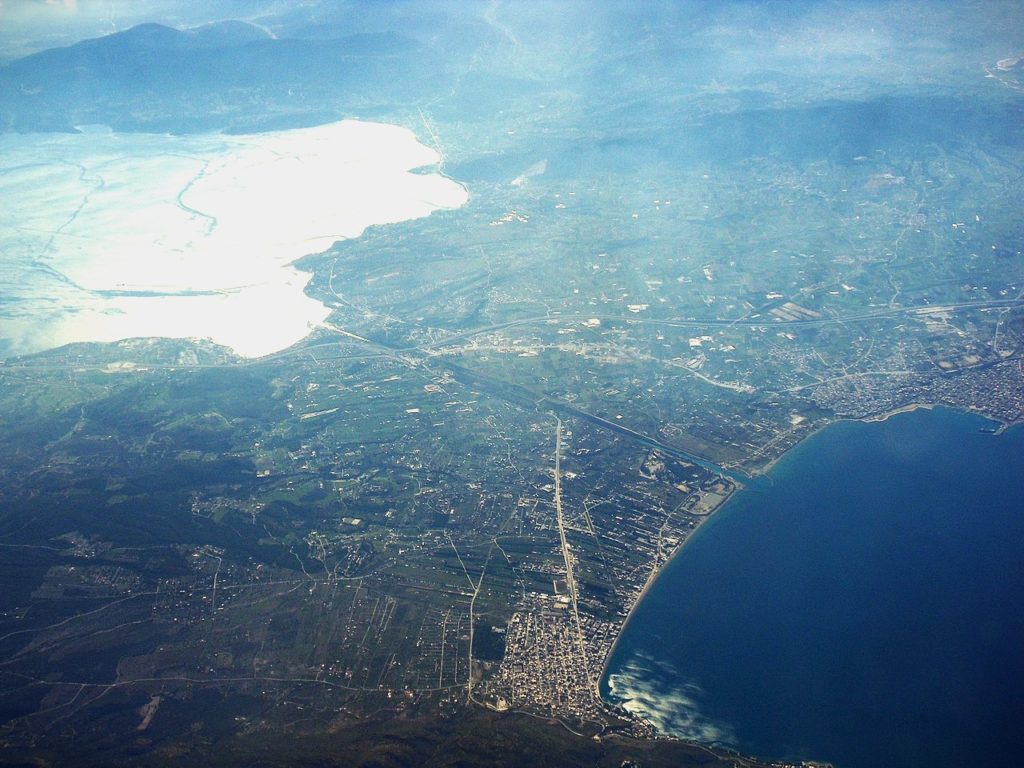
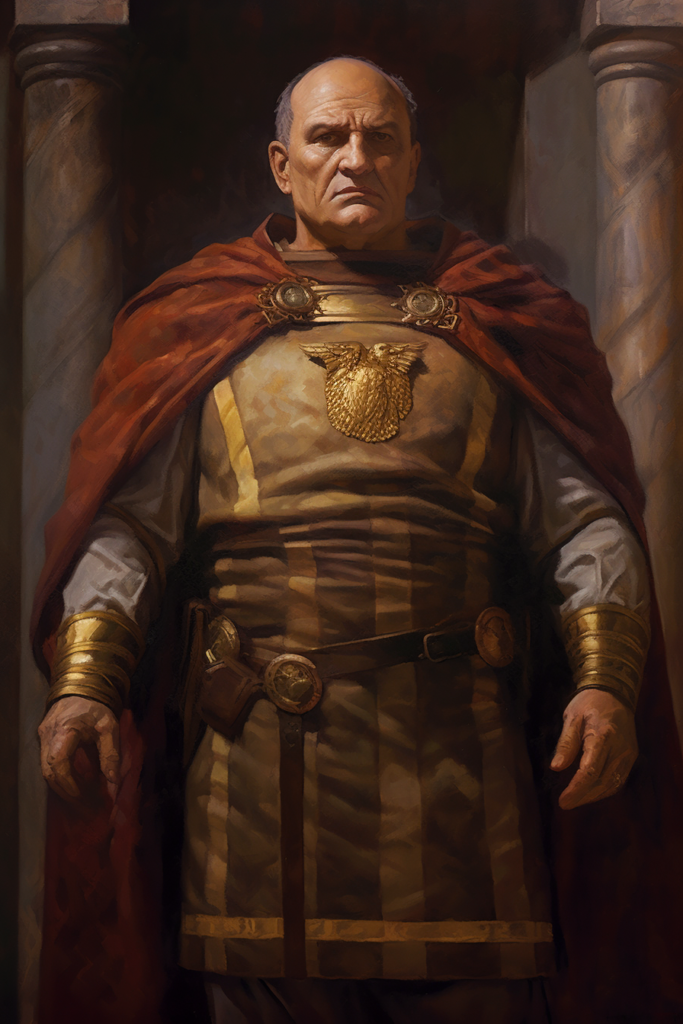
Greatly angered by what Gallus’s ambassadors told him, Nero decided that the rebellion in Judah must be thoroughly crushed before it could spread to other subject nations. To accomplish this and severely punish the Jews for their insubordination, the emperor selected his most venerable general, Flavius Vespasian, recalling him from the midst of his latest campaign aimed at furthering Roman control of Britain. The general had proven himself ready for this mission, having previously suppressed a violent uprising among the rebellious Germans.25Beasley, B. (2015). Flavius Josephus: The Jewish Wars. Living Stone Books.
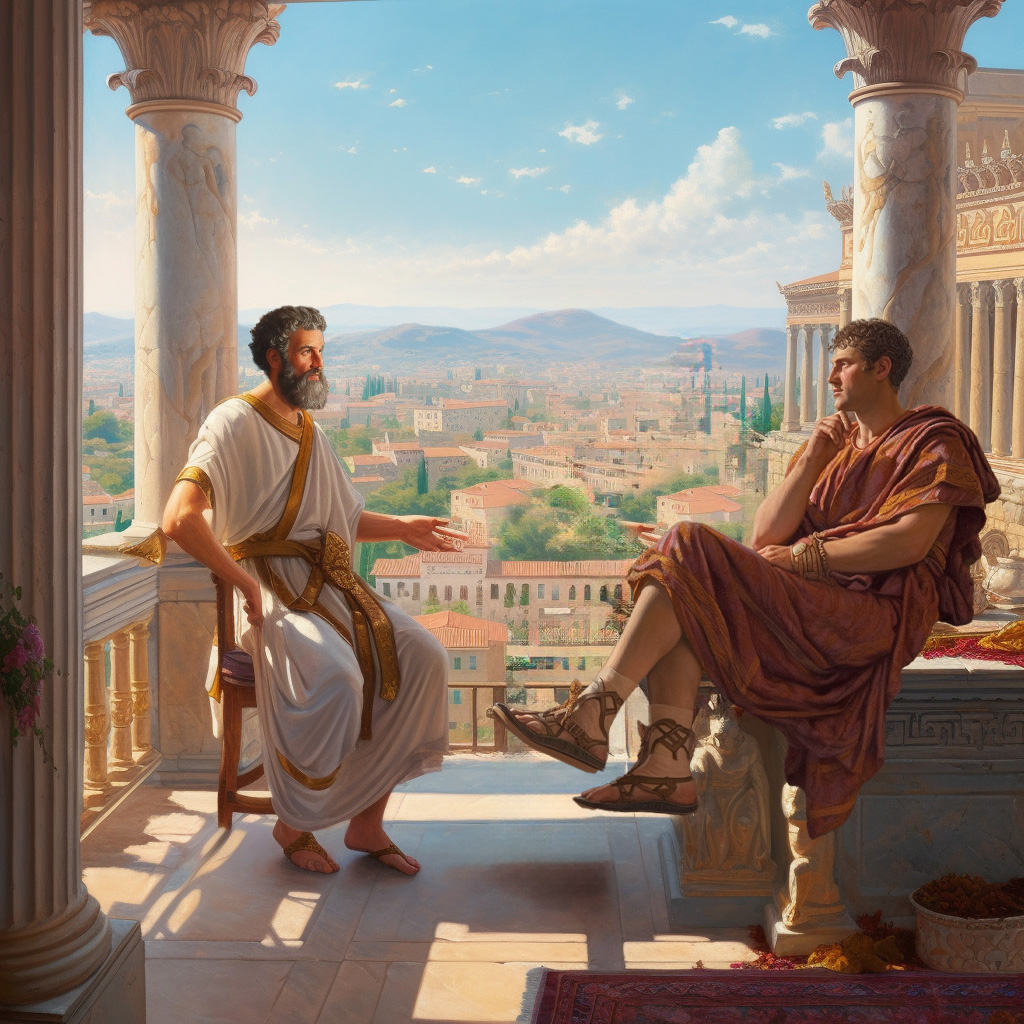
If the identification of Paul with this similar “Saul” is correct, it would mean the ultimate result of his bitter disputes with James the Just, Peter, and their fanatically Jewish Law-abiding Jerusalem-based earliest Christian church, was to convince the emperor of Rome to send his best general with an overwhelming number of legions to destroy them. No further writings, historical, biblical, or otherwise mention Paul or this “Saul” again, though his (their?) actions in life would have the most immense impact imaginable on billions of people around the world through the centuries. Having wrested Christianity from its originators, he redefined it in ways abhorrent to James’s community. His Gentile followers would eventually come to define normative Christianity, and his possible role as ambassador to Nero may well have sealed the fate of the original church.26Eisenman, R.H. (1998). James the Brother of Jesus: The Key to Unlocking the Secrets of Early Christianity and the Dead Sea Scrolls. Penguin.

A major Roman military campaign such as Vespasian’s would take months to prepare and mobilize. Aware of what they would soon face, the rebels quickly organized defensive plans and chose leaders. Eleazar, the bold captain of the Temple, was put in charge overall. Joseph Ben-Matityahu—who had studied under the wilderness-dwelling Essene Banus, and had sailed to Rome where he charmed Nero’s wife and won the release of ten Essene priests—was now made military commander of Galilee. Niger of Perea was put in charge of King Herod’s homeland Idumea. Others were to oversee the repairs of the city walls of Jerusalem and secure the defenses of other major cities throughout the land.27Beasley, B. (2015). Flavius Josephus: The Jewish Wars. Living Stone Books.
Still riding high off their success against the Roman army led by Gallus, the Jews went on the offensive. Niger of Perea and another rebel leader known as John the Essene led an attack on Ashkelon, a Gentile city on the coast that had originally been built by the Philistines—the ancient enemies of the Jews. Though only one cohort of Roman troops guarded the city, the rebels’ lack of military discipline foiled their plans. In a confused and chaotic assault, the Jews took heavy losses while Niger fought fiercely to protect their retreat.28Beasley, B. (2015). Flavius Josephus: The Jewish Wars. Living Stone Books.
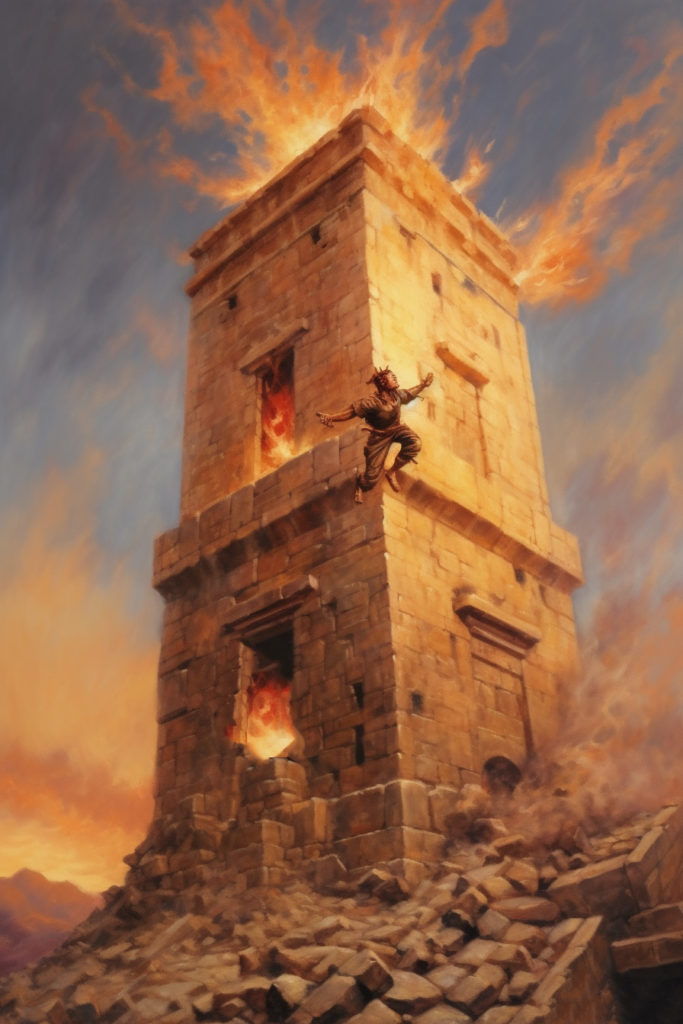
Undaunted, the spirited rebels marched back for a second assault on Ashkelon, but this time the Romans were more prepared and had set up ambushes along the route that cost the Jews hundreds and hundreds of lives. Put into retreat again, Niger and his men rushed into a strong tower built into the city wall of nearby Bezedel. Not wanting to waste time on a siege, or lose men to a direct attack, the Romans simply set the building ablaze and left, assuming Niger had been killed. But the commander leapt out of a window and managed to hide inside a cave. When he emerged alive three days later, some of his comrades in a search party found him and were overjoyed that God had saved him.29Beasley, B. (2015). Flavius Josephus: The Jewish Wars. Living Stone Books.
Epistle of Clement to the Corinthians
There is an early Christian epistle30Herron, T.J. (2008). Clement and the Early Church of Rome: On the Dating of Clement’s First Epistle to the Corinthians. Steubenville, OH: Emmaus Road. that didn’t make it into the New Testament, despite it being commonly seen by scholars as authentic.31 “Clement of Rome, St.” Cross, F. L. (2005). The Oxford Dictionary of the Christian Church. New York: Oxford University Press. Written by Clement of Rome 32Jurgens, W A, ed. (1970). The Faith of the Early Fathers: A Source-book of Theological and Historical Passages from the Christian Writings of the Pre-Nicene and Nicene Eras. Liturgical Press.—also known as Flavius Clemens, an early bishop of the empire’s capital33Buell, D.K. (1999). Making Christians: Clement of Alexandria and the Rhetoric of Legitimacy. Princeton: Princeton University Press.—it is a very lengthy letter to the church at Corinth to resolve administrative arguments and encourage humility and submission among his hearers.341 Clement, https://www.earlychristianwritings.com/text/1clement-lightfoot.html

But like the other early Christian writers we’ve seen, this author too is clearly unaware of any Jesus who recently had a ministry on Earth.35Wells, G.A. (2010). Did Jesus Exist? Prometheus Books. Any time Jesus is said to say anything, which is often, the messiah’s “sayings” are entirely made up of out-of-context quotes of Hebrew scripture. Even when information about Jesus is provided that sounds vaguely biographical, such as, “Our Lord Jesus Christ came, not in the pomp or arrogance of pride, as he could have, but in a lowly condition”, Clement’s evidence cited for this is not any story or shared memory from Jesus’s life, but only a quote from chapter 53 of the book of Isaiah.361 Clement, https://www.earlychristianwritings.com/text/1clement-lightfoot.html
There is one exception to this, where Clement says: “Remember the words of our Lord Jesus, for he said, ‘Woe to that man! It would have been good for him not to be born, rather than cause one of my chosen to stumble. Better for him to have a millstone cast about his neck and be drowned in the sea than to have corrupted one of my chosen’”. It’s possible that, like all the other Jesus “quotes” in this epistle, this one too may derrive from scripture—just not one we are familiar with, perhaps lost to time just as the Dead Sea Scrolls and The Teaching of the Apostles were for many centuries. It’s also possible that it’s something that was spoken by Jesus to an apostle in a vision. Interestingly, the gospels also later attribute these words to Jesus, but they do so by breaking up the quote into three parts which are each expanded into unrelated discourses and stories, none of which Clement shows any awareness of. Again the dependency must almost certainly be the reverse of what traditional scholars would expect—as we saw with The Teaching of the Apostles, it would seem that the later writers of the gospels mined earlier Christian writings like this for sayings to attribute to their newly historicized savior.37Eisenman, R.H. (1998). James the Brother of Jesus: The Key to Unlocking the Secrets of Early Christianity and the Dead Sea Scrolls. Penguin.

Like the epistle to the Hebrews, Clement portrays Jesus Christ as a heavenly high priest. And he quotes a passage very similar to one found in that epistle as well: “[Jesus Christ], who being the brightness of His majesty is so much greater than angels, as He hath inherited a more excellent name.” Along with the Ascension of Isaiah and Hebrews, this is now a third piece of evidence of that the earliest Christians believed and taught that the heavenly messiah was not given the name Jesus until after his redemptive sacrifice had been made in the firmament and he ascended back to God’s side.
Clement remarks to his audience on the recent deaths of the apostles Peter and of Paul, and it is our only source to place Paul’s death in Spain. Though the book of Acts ends abruptly with Peter still alive in Judah, and Paul still alive in Rome under lenient house arrest, the letters of Paul do record his intention to travel as far as Spain to preach the gospel. Assigning a date for the writing of 1 Clement derives from this mention of the deaths of Peter and Paul as well as its unawareness of the outcome of the war in Judah against Rome.38Carrier, R. (2014). On the Historicity of Jesus Sheffield. Phoenix Press.
Ben-Matityahu, Commander in Galilee
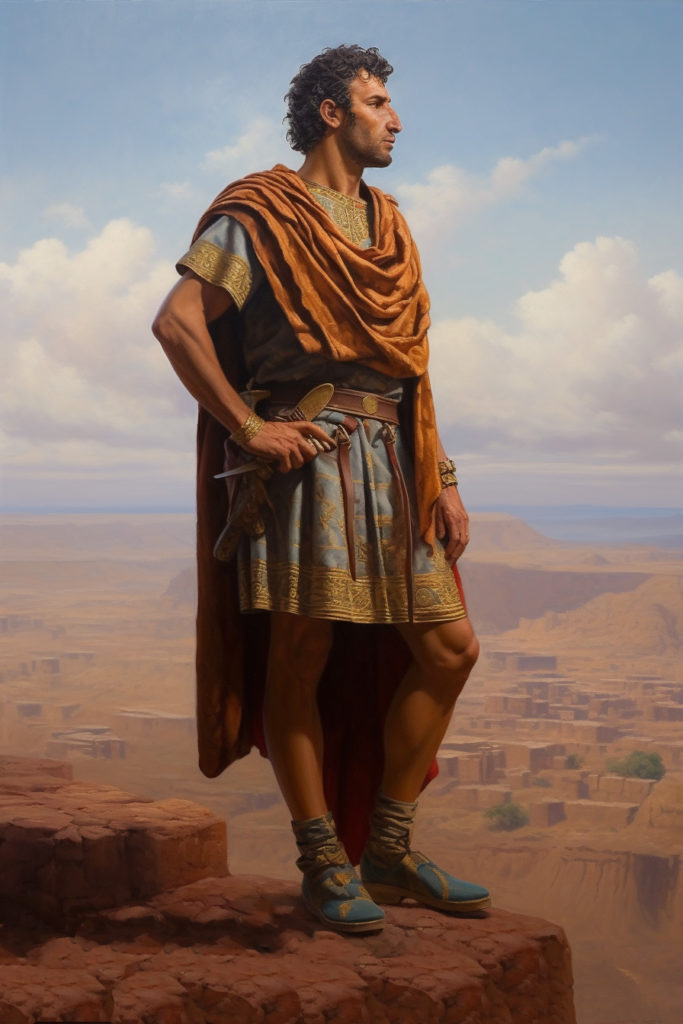
When the 30-year-old Commander Joseph Ben-Matityahu traveled north from Jerusalem to arrive in Galilee, he ordered his men to fortify the largest and most strategic Jewish cities in the region with city walls, including Jotapata, Tarichaea, and Tiberias. The region’s largest population center, the wealthy Greek-style city Sepphoris, with its mixed population of Gentiles and Jews was allowed to build its own walls. Nearly 100,000 Galileans gathered to form an army. Old weapons were gathered up with which to arm them, and they trained in the basics of warfare tactics and skills. Of the total, 60,000 were deemed by Ben-Matityahu to be fit for combat, with 250 as horsemen. He augmented this force by hiring 5,500 mercenaries, keeping 600 as his personal bodyguard.39Beasley, B. (2015). Flavius Josephus: The Jewish Wars. Living Stone Books.
The steward of King Agrippa II and his sister Berenice was traveling through the area at this time, and was set upon by a few young men from the Galilean army. They robbed him of a small fortune in gold and silver pieces and expensive garments. Attempting to win over their commander and gain a reward, they brought all the loot and set it before Ben-Matityahu in the city of Tarichaea where he was staying. But Ben-Matityahu was angry when he learned who the treasure was stolen from, and scolded them, saying that they had violated the royal couple. He made plans to return the stolen goods when he could. Having been born into nobility and raised as a Pharisee,40Beasley, B. (2015). Flavius Josephus: The Jewish Wars. Living Stone Books. Ben-Matityahu was likely identifying as an Essene at this point, but seems to have never fully embraced the sect’s hatred of the rich, hatred of Rome, and hatred of Jewish collaborationists .
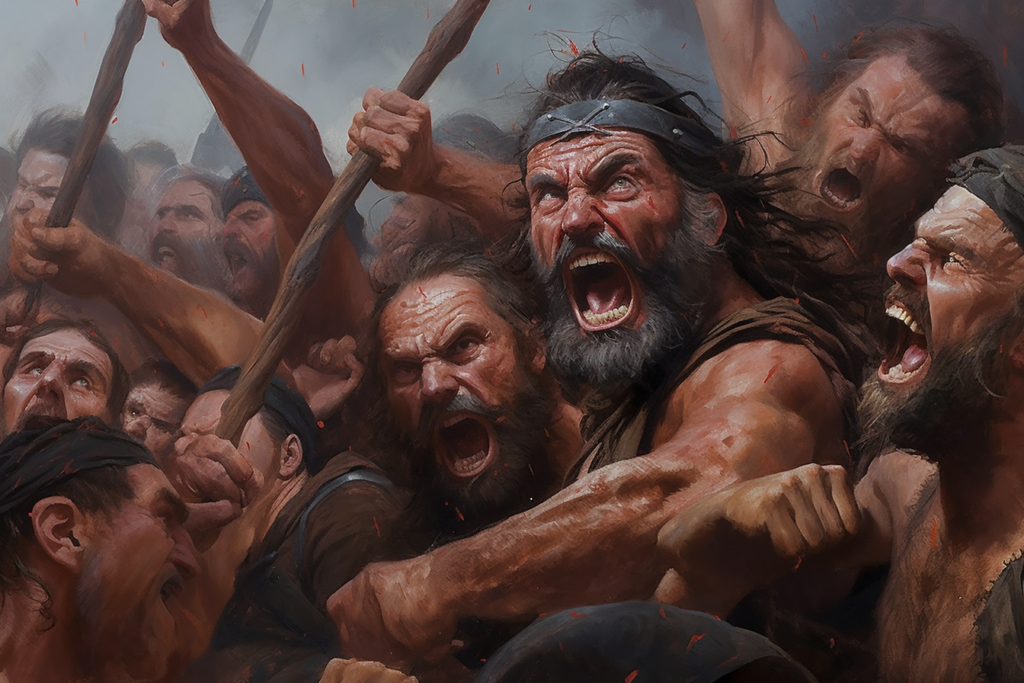
The young men were alarmed by their commander’s reaction and ran off, telling all the surrounding villages that, in standing up for Agrippa II, Ben-Matityahu was a traitor. In response, two thousand armed men gathered at the hippodrome in Tarichaea to voice their outrage at the commander who was supposed to defend them from Rome. There were shouts to remove him from office, and others to burn him alive. Seeing the size of the crowd and its anger, all of Ben-Matityahu’s bodyguards fled except four. In a traditional show of contrition, Ben-Matityahu tore his clothing and put ash on his head. He then went up on the roof of his building where he was staying to face the crowd.41Beasley, B. (2015). Flavius Josephus: The Jewish Wars. Living Stone Books.
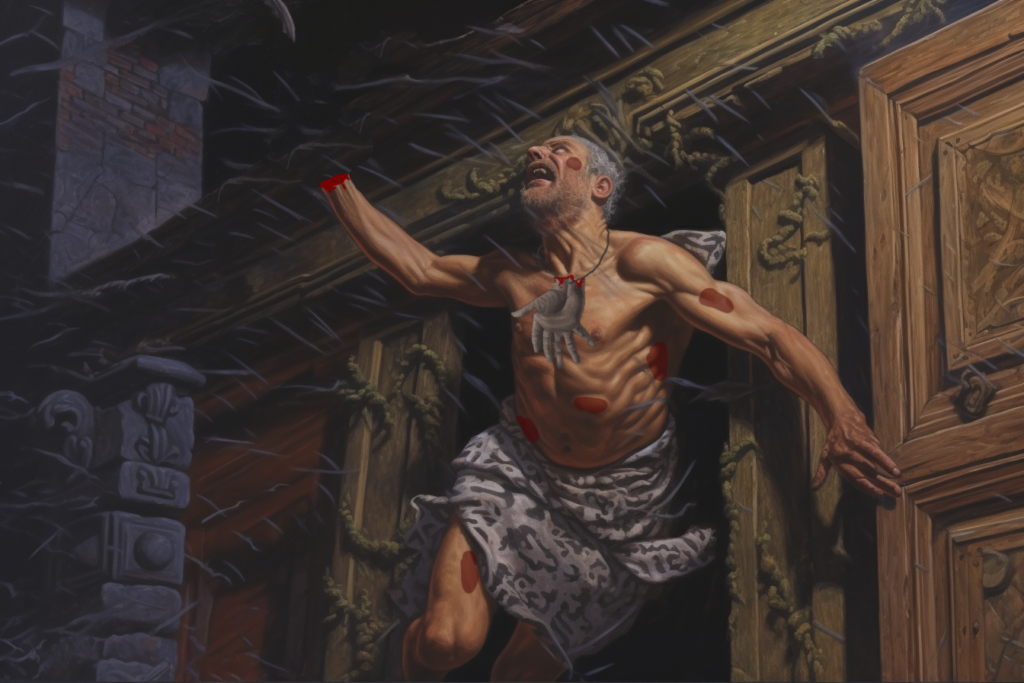
A great cacophony of threats and insults greeted the commander. When he could manage a word in, he told the people he couldn’t understand them since they were all talking at once. He promised to address all their concerns if they would send a few representatives inside the house to speak with him on their behalf. They did so, and one of commander’s guards met the people’s proxies at the door and led them to the back of the house. There, Ben-Matityahu ordered his bodyguards to whip and beat them until they were naked and bloody. He cut the hand off of one man and tied it around his neck before throwing them all outside before the gathered crowd. Terrified at the sight, they all dropped their weapons and ran off.42Beasley, B. (2015). Flavius Josephus: The Jewish Wars. Living Stone Books.
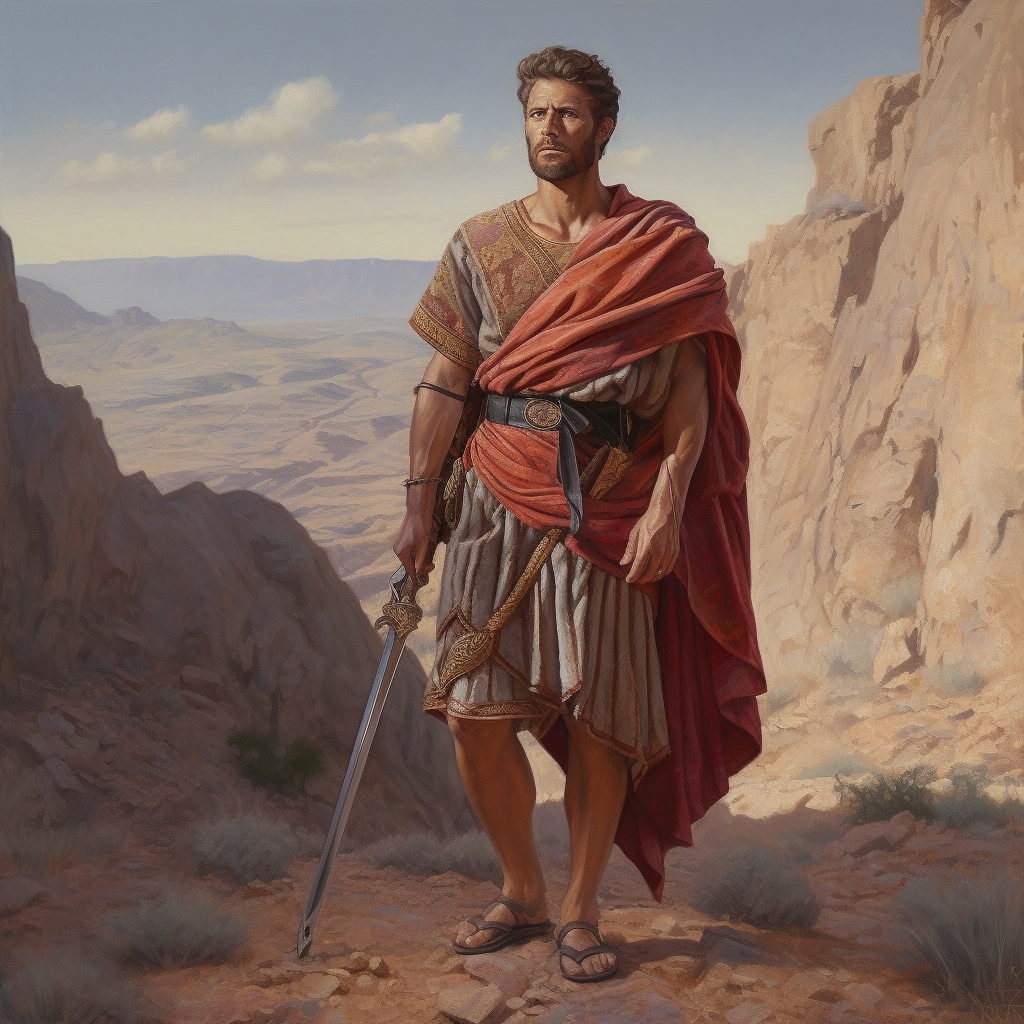
Word of his actions reached the city of Tiberias on the western shore of what was then known as Lake Gennesaret,43Beasley, B. (2015). Flavius Josephus: The Jewish Wars. Living Stone Books. which would later be mis-named the “Sea of Galilee” by the writer of the Gospel of Mark, and is today called Lake Tiberias.44Davidson, P. Did Mark Invent the Sea of Galilee? Is That in the Bible? https://isthatinthebible.wordpress.com/2016/08/29/did-mark-invent-the-sea-of-galilee/ When Ben-Matityahu arrived there with his personal guard, he met another angry crowd gathered in the city’s stadium. This time a group of men drew their swords and tried to assassinate the commander, forcing him to flee to the lakeshore where he commandeered a boat and sailed away with his guards. Discovering that the man who was inciting these cities against him was a man named John of Gischala—who had also been given a position of command in Galilee, Ben-Matityahu sent messengers out to the cities of Galilee giving them five days to reject John of Gischala, or he would burn their cities to the ground with their families inside.45Beasley, B. (2015). Flavius Josephus: The Jewish Wars. Living Stone Books.
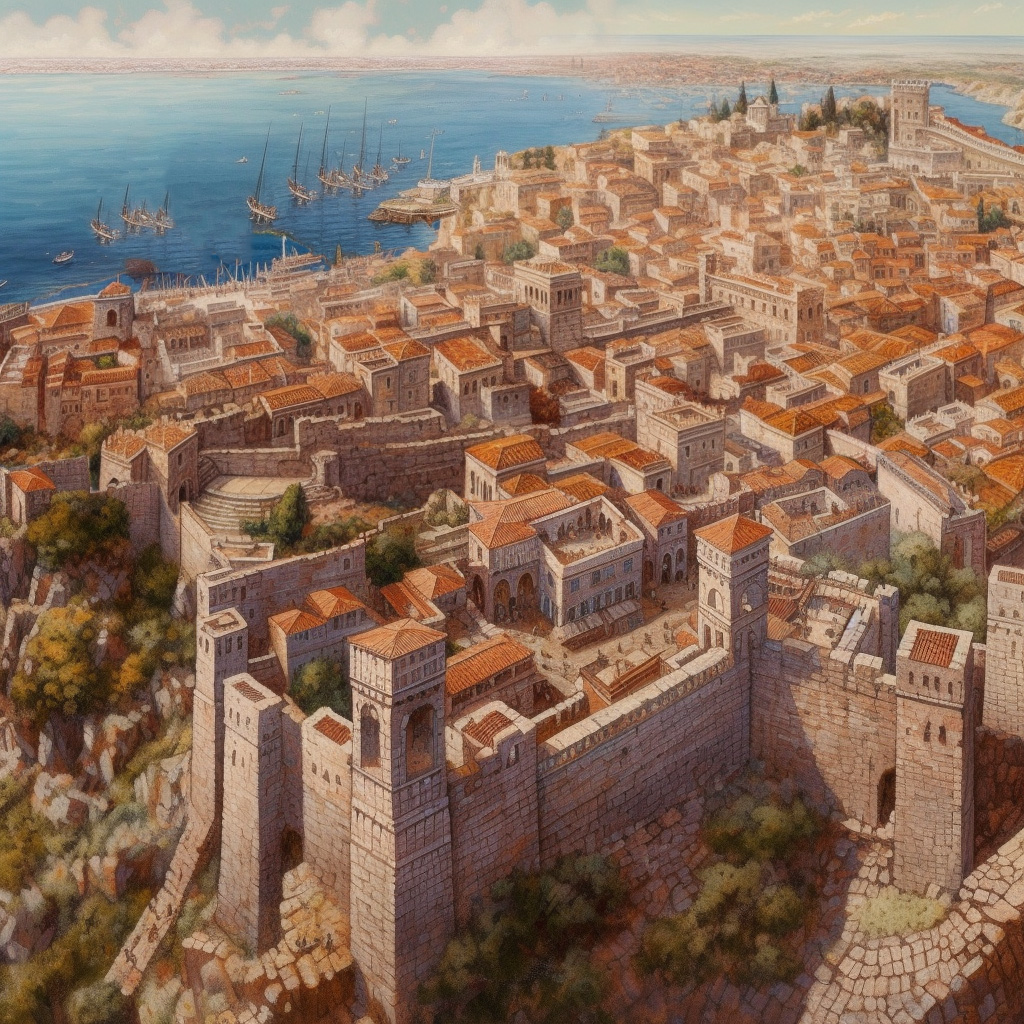
So John of Gischala sent a report of the commander’s words and actions to the rebel leaders in Jerusalem, and a decree was issued recalling Ben-Matityahu from his post. A small rebel army with four prominent emissaries was sent to deliver the message. If the commander did not comply willingly, they were ordered to treat him as an enemy. But Ben-Matityahu intercepted the emissaries and routed their forces. Meanwhile, the Gentile-majority population of Tiberias had decided to align with the Romans, allowing into the city some cavalry and soldiers sent by King Agrippa II. Knowing that his own personal guard would not be powerful enough to overpower Tiberias directly, Ben-Matityahu concocted a new plan.46Beasley, B. (2015). Flavius Josephus: The Jewish Wars. Living Stone Books.
From his base at Tarichaea to the south, he first closed up the city to make sure his plan would remain a secret. He commandeered 200 sailing vessels, putting a skeleton crew of only four of his men per ship. He then sailed his armada north to Tiberias, careful to stay at a distance where the city’s inhabitants could clearly see their number, but not discern how empty the ships were. Ben-Matityahu then brought only a few men with him on a small boat he took near the shore and made a show of intimidation, angrily peppering the people of Tiberias with threats and insults. Terrified of what looked like a large invasion force waiting in the wings, they surrendered the city to the commander and pledged loyalty to him.47Beasley, B. (2015). Flavius Josephus: The Jewish Wars. Living Stone Books.
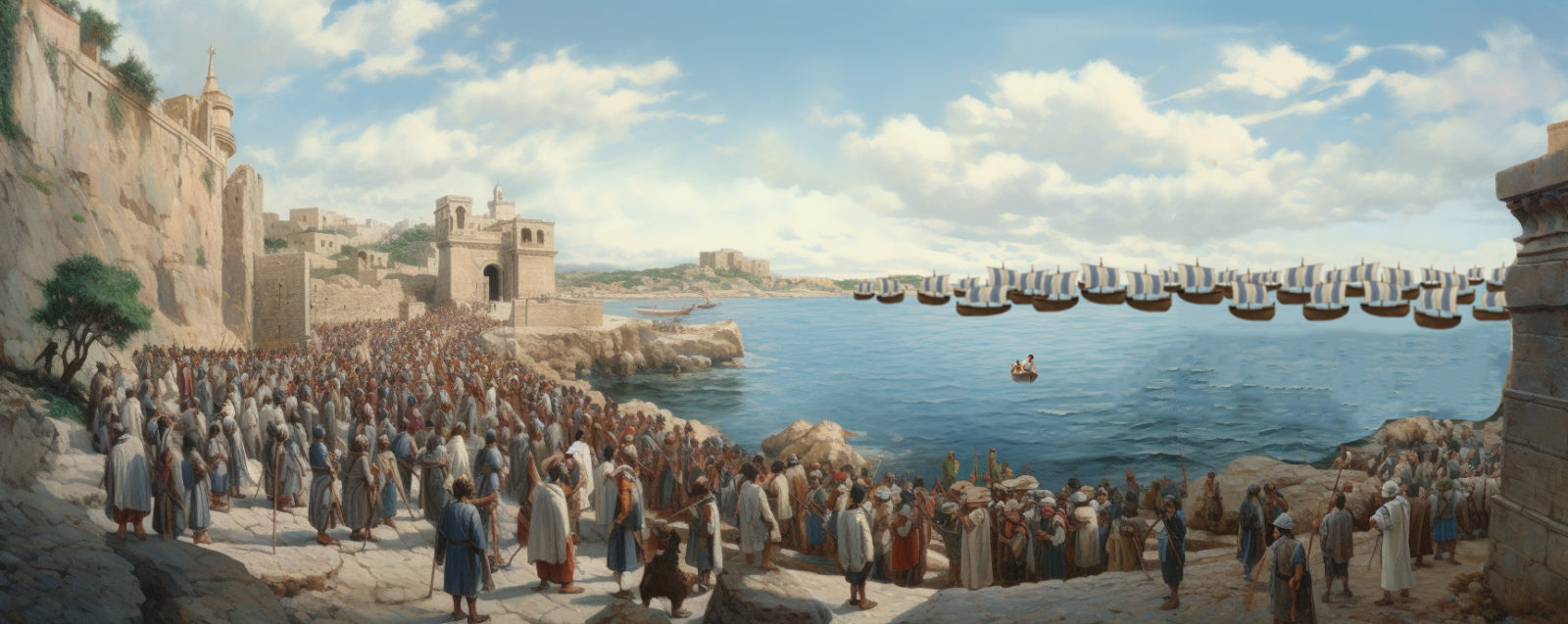

To avoid the commander punishing the entire city, the citizens of Tiberias handed over a man named Clitus who they said was the instigator of their rejection of Ben-Matityahu. Eager to end the confrontation before his ruse was discovered, the commander accepted their proposal that one man take the blame for all, and ordered one of his soldiers to cut Clitus’s hands off. Clitus, however, made many pleas to Ben-Matityahu to show him some small mercy by only cutting off one hand. The commander acquiesced to this, but on the condition that Clitus perform the amputation himself, which he then did, there on the shore of the lake.48Beasley, B. (2015). Flavius Josephus: The Jewish Wars. Living Stone Books.
Ben-Matityahu then moved on and punished several other Galilean cities that had rejected his authority or sided with King Agrippa II or the Romans. He adopted a policy of plundering their wealth as punishment, but then magnanimously returning all that had been taken in an effort to win their favor.49Beasley, B. (2015). Flavius Josephus: The Jewish Wars. Living Stone Books.
Vespasian and Titus Arrive in Galilee

Emperor Nero had never stopped mourning over his own murder of his wife Poppea. Now, having dispatched his best general Vespasian to lead the campaign against the Jews, Nero remarried, this time to a young man named Sporus who bore a strong resemblance to Poppea. The emperor had his new spouse castrated and dressed in outfits typical of an empress, and had him accompany him on his many trips between Rome and his base of operations in Corinth.50Ancient History Sourcebook: Suetonius: De Vita Caesarum – Nero, c. 110 C.E. https://sourcebooks.fordham.edu/ancient/suet-nero-rolfe.asp

Vespasian crossed by land from Greece into Asia Minor and then south into Syria, where a Roman legion was awaiting his command. His son Titus led two additional legions from Alexandria in Egypt, marching them east and then north until the two armies combined into one force of some 60,000 soldiers, cavalry, and war machines on the coast of Galilee. Upon his arrival, the Roman general was warmly greeted by many accommodationist Jews—likely Pharisees and Sadducees—who pledged their complete loyalty to Rome. Even some who were in favor of revolt now gave up such notions upon seeing the size and sophistication of the imperial forces.51Beasley, B. (2015). Flavius Josephus: The Jewish Wars. Living Stone Books.
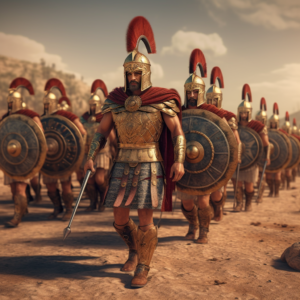
A few thousand Roman infantry and horsemen were sent to protect Galilee’s largest city Sepphoris where the Gentile citizens welcomed them. Even though he had just recently ordered the rebuilding of their city walls, commander Ben-Matityahu now decided to assault the city he had so recently sought to defend. But not only was his force too weak to overrun the city, his actions angered Vespasian who then declared war on all towns and cities in Galilee, and sent troops throughout the countryside to kill any able-bodied men they came across and sell the rest into slavery. In panic and misery, the people of Galilee fled their homes, taking shelter in the handful of fortified majority-Jewish cities.52Beasley, B. (2015). Flavius Josephus: The Jewish Wars. Living Stone Books.

The first of these fortified Galilean cities taken by the Romans was Gadara which lacked any significant number of defensive troops. Upon its capture, all of the young men of the city were slaughtered without mercy. The city and surrounding villages were burnt to the ground, and their inhabitants sold into slavery. Commander Ben-Matityahu brought his rebel forces to the relatively well-protected city of Tiberias, but his presence there alarmed the residents who did not wish to become the next target of imperial vengeance. While there, the commander wrote a letter to the rebel leadership in Jerusalem describing the size and makeup of the Roman forces in Galilee, and asking them to write back immediately if they would consider terms of surrender.53Beasley, B. (2015). Flavius Josephus: The Jewish Wars. Living Stone Books.

Soon after this, Vespasian heard reports that the majority of the rebel fighters in Galilee had fled to the well-defensible high-walled city of Jotapata which encompassed the top of a high hill in a mountainous area that allowed very few approaches. The road toward the city was twisty and rough, allowing men to pass, but not horses, war machines, and other equipment. So the general ordered hundreds of his men to spend four days creating a wide road that would allow the entire army to pass. Just before the Romans sent out horsemen to surround the city to prevent anyone from entering or leaving, Joseph Ben-Matityahu arrived and took command of the city’s defense. The following day Vespasian himself arrived, and the Romans established camps just far enough away from the city walls to avoid missiles and projectiles hurled by those inside.54Beasley, B. (2015). Flavius Josephus: The Jewish Wars. Living Stone Books.
The Siege of Jotapata
In early June of 67 CE, Vespasian ordered his troops to take Jotapata by force rather than lose time to a drawn-out siege. For five days the Roman forces attempted to approach the city walls but were consistently driven back by defenders atop the high walls raining down darts, javelins, and missiles; and by sporadic throngs of Jewish fighters who would sally out to engage the Romans head-on with a fury they had not expected to face.55Beasley, B. (2015). Flavius Josephus: The Jewish Wars. Living Stone Books.
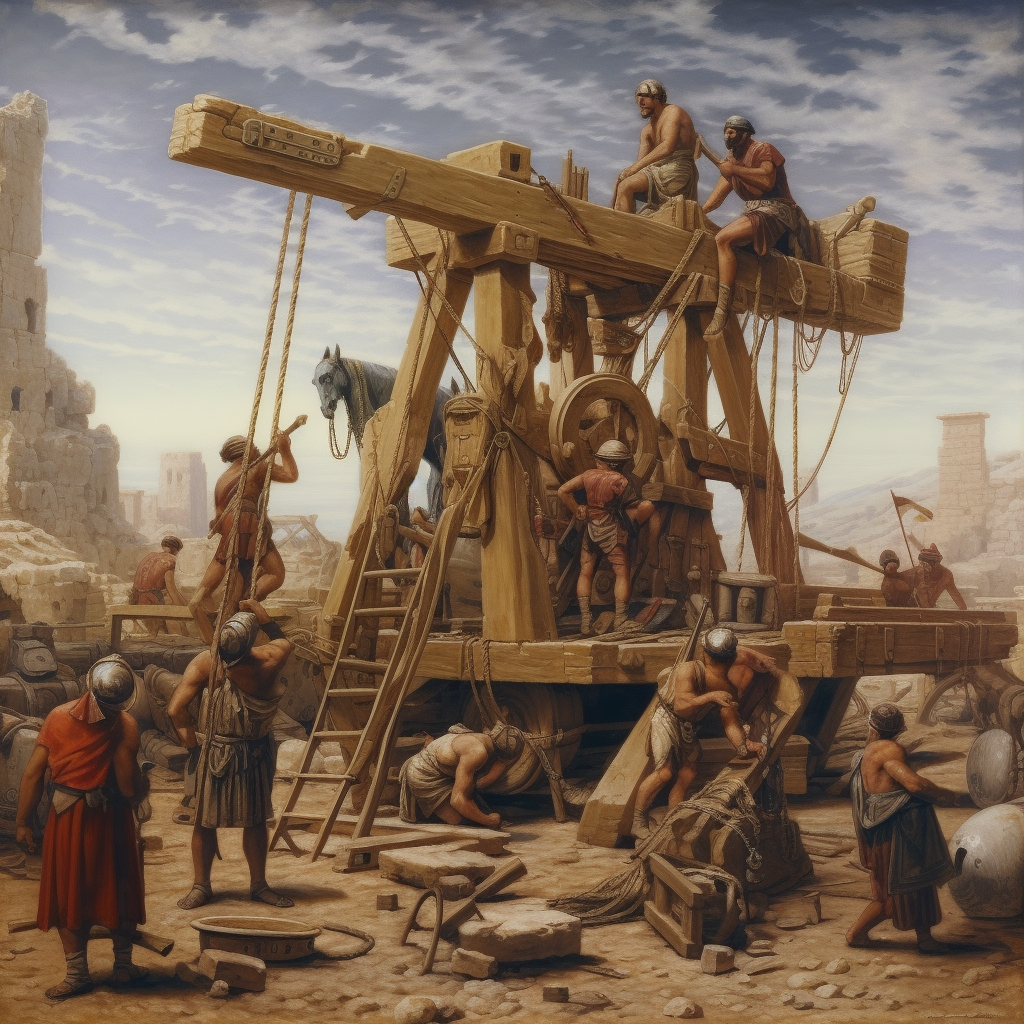
So Vespasian now ordered the building of an embankment—a huge ramp of stones and earth that would allow the approach of a battering ram. The Jews’ continuous assaults on those constructing the ramp greatly hampered their progress, so the Romans constructed wooden towers that were so tall the archers and slingers inside could look down with easy aim against the defenders lining the top of the city walls. To counter this, the Jews would send lightly armored men to run as fast as they could to set the towers on fire.56Beasley, B. (2015). Flavius Josephus: The Jewish Wars. Living Stone Books.
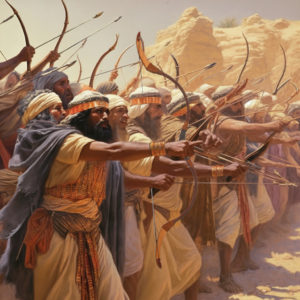
Turning up the intensity of the attack, Vespasian brought in his catapults and ballistas (similar to catapults but using smaller projectiles and capable of faster reloading), and ordered his contingent of Arabian archers to fire continuously to clear the tops of the walls of defenders. In all, the Romans sent a rain of arrows, flaming logs, and stones of up to 60 lbs into the city itself, sending those inside scrambling for cover. The increasingly desperate rebels resorted to greater numbers of lightning quick raids against the workers on the embankments, the war machines—even stealing supplies out of the Roman camps at night. When the embankment against the city wall continued to rise, the rebels inside scrambled to build the wall an additional ten feet higher, protecting their workers by raising large sheets of animal skins over their heads to deflect projectiles.57Beasley, B. (2015). Flavius Josephus: The Jewish Wars. Living Stone Books.

The Romans then pivoted their strategy. Having seen from their tall wooden towers that the citizens inside Jotapata were waiting in ration lines for water, they now pulled all their troops and workers away from the city walls. They kept horsemen surrounding the city to prevent escape, but otherwise simply exercised patience and let time weaken their enemy to the point of either surrender or death from thirst. The rebel leadership inside the city knew that water would soon run out, and they all expressed their wish to die in battle against the Romans rather than perish without a fight. So they gathered up a great amount of the people’s laundry and soaked it in what little water they had left, then they hung it over the top of the city wall facing the Roman camps. As Vespasian and his army saw how carelessly the Jews wasted water, they became convinced they must have a secret spring within the city walls, and that their siege would take far too long under such conditions.58Beasley, B. (2015). Flavius Josephus: The Jewish Wars. Living Stone Books.
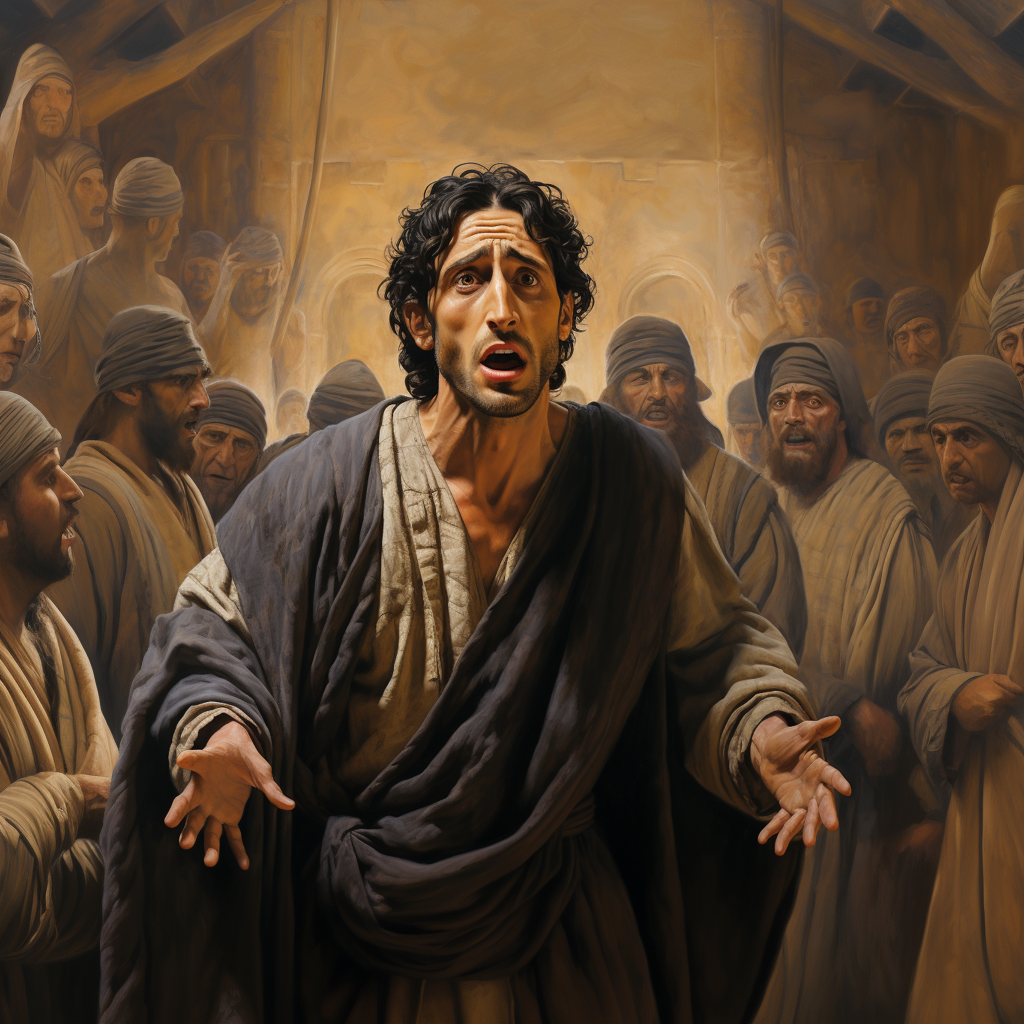
Having now spent over a month attempting to take a single city in Galilee—far removed from the rebel leaders and the majority of their forces in Jerusalem—the Romans shifted back to a frontal assault on the city wall, with less patience and greater determination than ever. At this time commander Ben-Matityahu knew that the city would not hold out much longer, so he met in secret with some of the city’s most prominent men, discussing how their group of elites might survive through an escape. But some of the citizens heard about this and threatened to arrest him if he tried such a thing. Attempting to save face, he announced that he “resolved” to stay—and now that there was no chance of his escape—proclaimed that it was a brave thing to prefer glory over life.59Beasley, B. (2015). Flavius Josephus: The Jewish Wars. Living Stone Books.

Vespasian now brought out his battering ram and had his strongest men pull it slowly up the embankment until it was flush against the city wall. All the while, the Arabian archers, slingers, ballistas, and catapults fired continuously to keep the top of the city wall clear of any defenders. The ram—a massive wooden log capped by an iron ram’s head and elevated by chains, was now pulled back by a team of trained men, and then swung forward, striking the wall with such force and deafening noise that the whole city shook. As the ram continued its repeated assaults, the rebels acted quickly, filling bags with wheat chaff, and lowering them down until they took some of the ram’s force. The Romans paused to remove the annoyance by cutting the ropes holding the bags in place. But while they were distracted, rebel troops rushed out of the city once again with bitumen, pitch, and brimstone as improvised explosive material, and set fire to many of the catapults and ballistas.60Beasley, B. (2015). Flavius Josephus: The Jewish Wars. Living Stone Books.
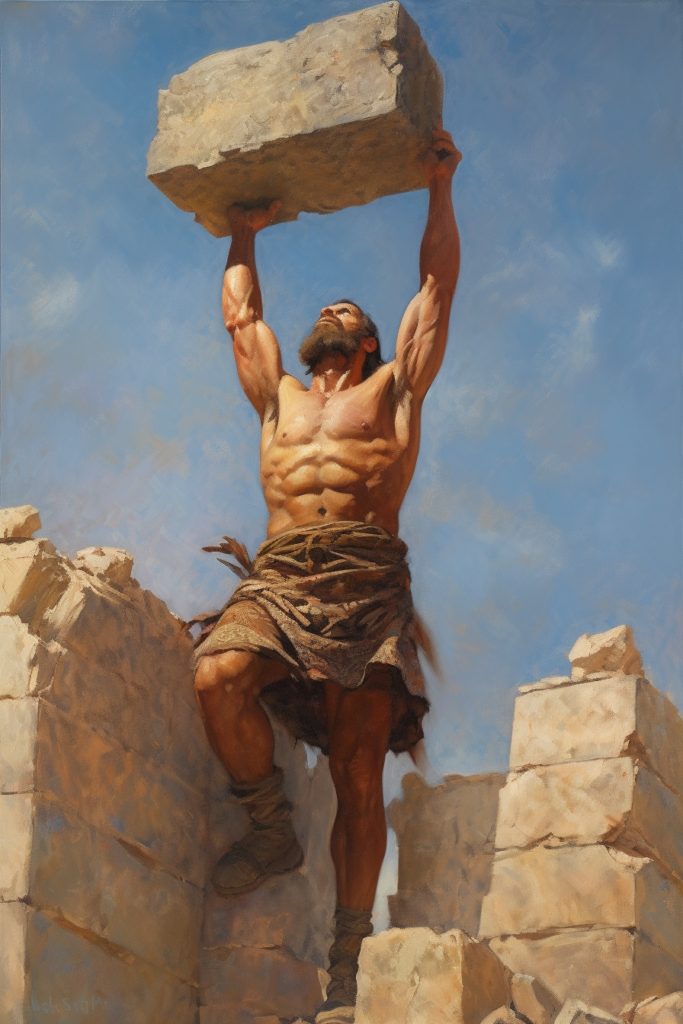
At this point, a Galilean man named Sameas stood atop the city wall, lifted a large boulder over his head and threw it directly down onto the battering ram, breaking its iron head right off. He then leapt down amid the Romans, picked it up, and carried the ram’s head back to the top of the city wall with him. Once the momentary shock of his actions wore off, hundreds of Roman soldiers targeted him with projectiles, and he was hit by five darts. Showing no notice of his injuries he stood defiantly on top of the city wall before crumpling backward and keeling over dead. Two other rebels then jumped over the wall onto the Roman troops below, sowing chaos as they ran with blazing torches, attempting to burn anything of value to the Romans.61Beasley, B. (2015). Flavius Josephus: The Jewish Wars. Living Stone Books.
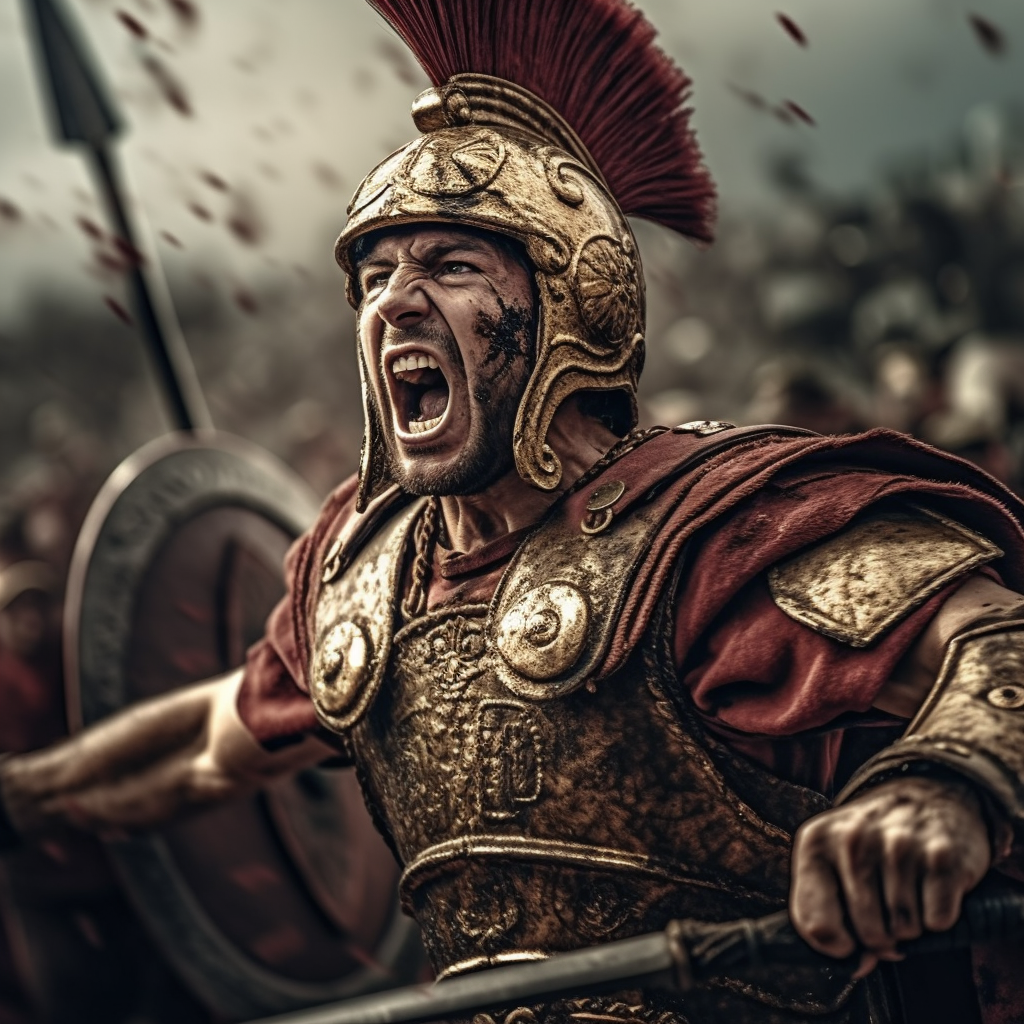
As the two sides exchanged another flurry of missiles and darts, word quickly shot through the Roman camp that general Vespasian had been injured. Alarmed, his son Titus ran across the battlefield to him, but the wound proved to be mostly superficial. A dart thrown a great distance had hit his foot. Nonetheless, Roman armies had long taken it personally if their general was wounded by the enemy, and they swore now to avenge him. The legionaries became determined not to stop until they breached the city, while the rebels inside were forced to brave the never-ending onslaught of missiles and darts on top of the city walls to keep the enemy away.62Beasley, B. (2015). Flavius Josephus: The Jewish Wars. Living Stone Books.

The battle continued through the night with little or no visibility. At one point a defender was decapitated by an incoming stone, his head landing several hundred feet from his body. For hours on end the sound of projectiles sailing past mixed with the thuds of the rebels’ bodies falling to the ground below and the shrieks and screams of the women inside. When dawn broke, Vespasian ordered his troops to scale the walls by ladder. Meanwhile, Ben-Matityahu urged the rebel soldiers to imagine the imminent slaughter of their wives and children, and to let their fury guide them in avenging their deaths with their last ounce of strength. The helpless, panicked women, he commanded to stay inside lest their cries distract the men.63Beasley, B. (2015). Flavius Josephus: The Jewish Wars. Living Stone Books.
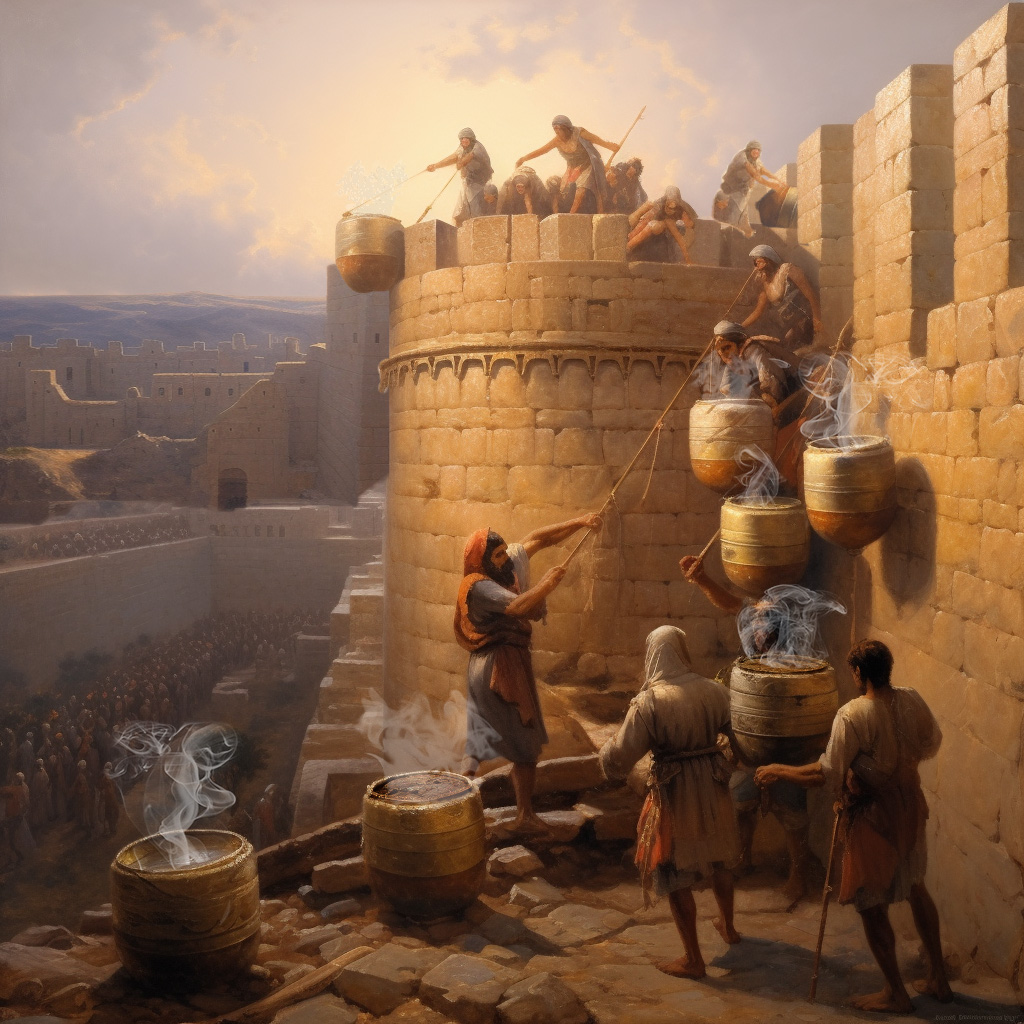
As the Romans began to scale their ladders, the rebels boiled vats of oil and poured it over their heads, scalding their entire bodies as it seeped through the openings of their armor, causing them to scream in pain as they fell. When they exhausted their oil supply, they poured a boiling fenugreek potion over the ladders, causing the climbers to lose their grip, and rendering them too slippery to climb. Vespasian had his men construct three new tall towers including iron-clad outer walls which prevented them from burning. At this time, a deserter from the city came to the general’s camp. He revealed the poor condition in the city with all their fighters utterly exhausted. He recommended attacking them in the early morning hours when the guards often fell asleep.64Beasley, B. (2015). Flavius Josephus: The Jewish Wars. Living Stone Books.
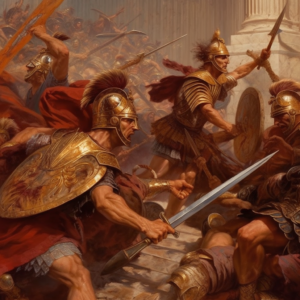
Suspicious that the defector might be lying, Vespasian had him tortured with fire and then crucified. But when he nonetheless did not change his story, they took him down from the cross and followed his advice. On the 47th day of the siege of Jotapata, Titus led a few soldiers on a silent mission over the city wall, and then slit the throats of the sleeping guards. More soldiers followed, and before the rest of the sleeping citizens and soldiers realized what was going on, they were being slaughtered. In what would become a signature of Essene fighters, many chose to commit suicide rather than allow the foreigners to kill them. Some, too weak to end their own lives, bore their necks to the Roman soldiers. All of the several thousand men in the city were slaughtered and the women and infants sold into slavery.65Beasley, B. (2015). Flavius Josephus: The Jewish Wars. Living Stone Books.
Ben-Matityahu’s Betrayal
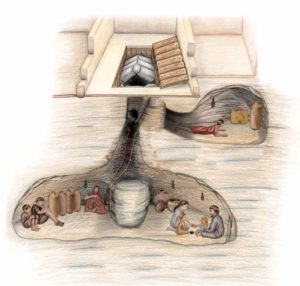
Along with 40 survivors, Joseph Ben-Matityahu had managed to hide from the Roman onslaught inside the city by crawling through a small cave that opened into a den which was hidden from view. By night the commander would leave the cave to determine if there was a route toward freedom, but the presence of the Roman soldiers was too great to allow it. Then on the third day, he was spotted while re-entering the den. Soldiers ran over with torches to burn those inside alive, but they were held off by a tribune named Nicanor from Galilee who was working for the Romans and who was an associate of Ben-Matityahu. He shouted to the Jewish commander, encouraging him to come out, promising him safety.
As soon as the cave had been discovered, the Jews hiding with Ben-Matityahu had resolved to commit suicide, but now the commander urged them to surrender instead. At this, the angered men berated Ben-Matityahu as a coward and a traitor. The commander swore he would not betray his own people, and argued that to commit suicide was a grave sin that would cause them to go to Hell. The men remained unmoved, however, and now threatened to kill him.

Finally, Ben-Matityahu acceded. He suggested a plan by which—to avoid the sin of suicide—each man would kill the next until they were all dead. He had them draw lots to determine the order.67Beasley, B. (2015). Flavius Josephus: The Jewish Wars. Living Stone Books. (Besides its use in stories from the Hebrew Bible to determine God’s will, the drawing of lots was notably used among the Essenes. The book of Acts also portrays the earliest Christians drawing lots to determine a new member of the Twelve Apostles when one of them died.)68Acts 1:26. The Bible. New International Version. Ben-Matityahu drew the second to last lot and so watched as the rest of the men bore their necks to the next man who then slit his throat. When it was the commander’s turn to be killed by the last man, however, he managed to talk him out of it and to surrender to the foreign enemy instead.69Beasley, B. (2015). Flavius Josephus: The Jewish Wars. Living Stone Books.
As Nicanor led him out of the city to Vespasian, there were many threats from soldiers and calls for his death. Titus, who was the same age as Ben-Matityahu, argued for him to be kept alive as a prisoner. Vespasian agreed to this, but ordered he be kept under heavy guard, and he planned to soon send him off to Nero. Attempting to avoid such a fate, Ben-Matityahu then spoke up, proclaiming that it was God’s will that Vespasian would soon become emperor. A friend of Vespasian scoffed and asked why, if he was a prophet, he hadn’t predicted the fall of Jotapata. Ben-Matityahu responded that he did indeed tell his fellow soldiers that the city would be destroyed. Some Jewish prisoners verified that he had indeed said that, and so Vespasian and Titus began to take him more seriously and treated him with kindness, dressing him in new clothes and offering him gifts.70Beasley, B. (2015). Flavius Josephus: The Jewish Wars. Living Stone Books.
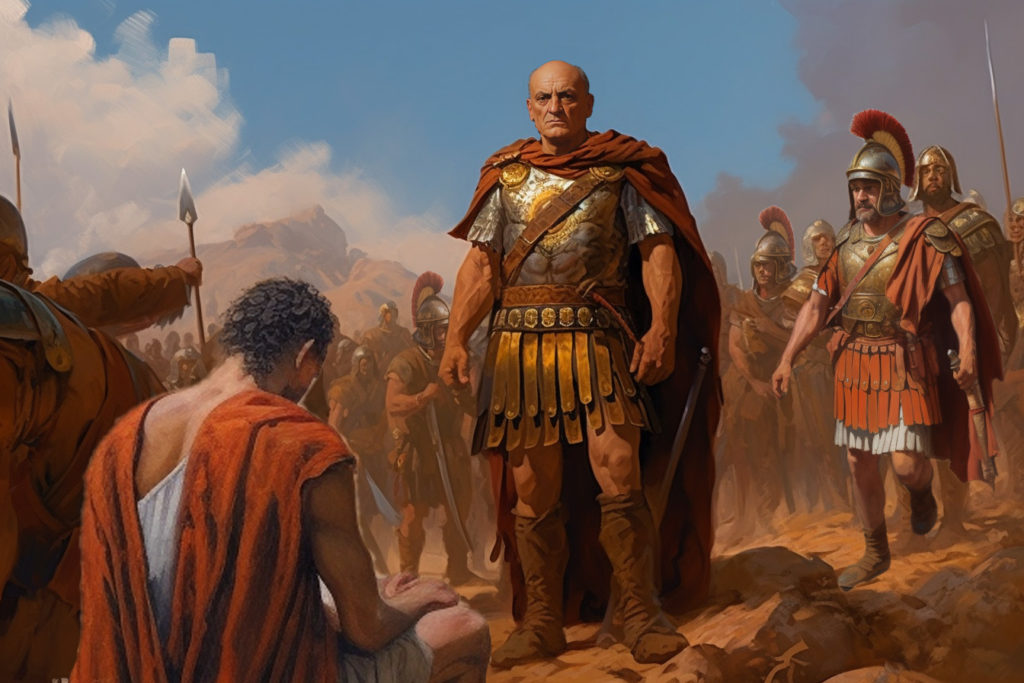

After the destruction of Jotapata, the Romans moved to subdue Tiberias and Tarichaea. While the citizens of Tiberias kicked out the rebels among them and pledged their loyalty to Vespasian, these same shunned rebels fled and then regrouped at Tarichaea. There they fought the Romans from boats on the lake, but were ineffectual against the well-armored and disciplined soldiers who cut them to pieces. Vespasian took the city by entering in from the side facing the lake which had no wall. They rounded up the citizens in the local stadium. There they separated out the elderly and those deemed “useless”, and slaughtered them. But thousands of able-bodied men were taken captive and sent to Nero in Corinth where they became slaves working on his canal project there.71Beasley, B. (2015). Flavius Josephus: The Jewish Wars. Living Stone Books.
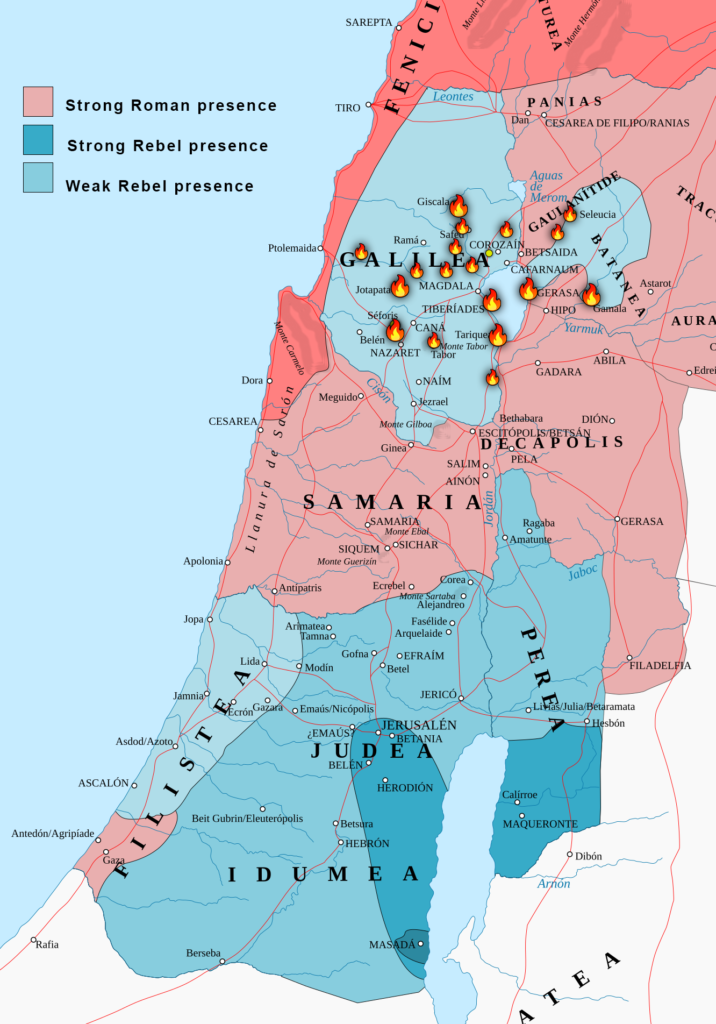
The Romans next took the fortress at Mount Tabor and besieged the city of Gamala (“Camel”, so named for its hump-like appearance) which put up a strong fight, but was overcome. When Titus led a final attack on the citadel of the city, more residents leapt to their deaths off the high city walls than were killed by the Romans. No one who was caught was spared, though a number of rebel fighters managed to escape and join those at Jerusalem. When the city of Gischala then surrendered without a fight, the Romans had completed their pacification of Galilee.72Beasley, B. (2015). Flavius Josephus: The Jewish Wars. Living Stone Books.
Vespasian then marched his army south to Caesarea where the Gentiles of the city warmly welcomed him. When the citizens saw that Ben-Matityahu had been allowed to survive, they shouted for his death. Reports of the military disasters in Galilee now reached Jerusalem, and the rebels there were horrified and angrier than ever at the Romans, on whom they swore to take vengeance. When they learned that Ben-Matityahu had been taken prisoner and was being treated well by Vespasian, they became full of indignation and endlessly cursed him as a coward and a deserter.73Beasley, B. (2015). Flavius Josephus: The Jewish Wars. Living Stone Books.
Continue Reading:
Chapter 13: The Battle for Jerusalem
Footnotes
- 1Beasley, B. (2015). Flavius Josephus: The Jewish Wars. Living Stone Books.
- 2Beasley, B. (2015). Flavius Josephus: The Jewish Wars. Living Stone Books.
- 3Beasley, B. (2015). Flavius Josephus: The Jewish Wars. Living Stone Books.
- 4Beasley, B. (2015). Flavius Josephus: The Jewish Wars. Living Stone Books.
- 5Eisenman, R.H. (1998). James the Brother of Jesus: The Key to Unlocking the Secrets of Early Christianity and the Dead Sea Scrolls. Penguin.
- 6Beasley, B. (2015). Flavius Josephus: The Jewish Wars. Living Stone Books.
- 7Beasley, B. (2015). Flavius Josephus: The Jewish Wars. Living Stone Books.
- 8Beasley, B. (2015). Flavius Josephus: The Jewish Wars. Living Stone Books.
- 9Beasley, B. (2015). Flavius Josephus: The Jewish Wars. Living Stone Books.
- 10Beasley, B. (2015). Flavius Josephus: The Jewish Wars. Living Stone Books.
- 11Beasley, B. (2015). Flavius Josephus: The Jewish Wars. Living Stone Books.
- 12Beasley, B. (2015). Flavius Josephus: The Jewish Wars. Living Stone Books.
- 13Beasley, B. (2015). Flavius Josephus: The Jewish Wars. Living Stone Books.
- 14Beasley, B. (2015). Flavius Josephus: The Jewish Wars. Living Stone Books.
- 15Beasley, B. (2015). Flavius Josephus: The Jewish Wars. Living Stone Books.
- 16Beasley, B. (2015). Flavius Josephus: The Jewish Wars. Living Stone Books.
- 17Beasley, B. (2015). Flavius Josephus: The Jewish Wars. Living Stone Books.
- 18Beasley, B. (2015). Flavius Josephus: The Jewish Wars. Living Stone Books.
- 19Beasley, B. (2015). Flavius Josephus: The Jewish Wars. Living Stone Books.
- 20Beasley, B. (2015). Flavius Josephus: The Jewish Wars. Living Stone Books.
- 21Beasley, B. (2015). Flavius Josephus: The Jewish Wars. Living Stone Books.
- 22Beasley, B. (2015). Flavius Josephus: The Jewish Wars. Living Stone Books.
- 23Beasley, B. (2015). Flavius Josephus: The Jewish Wars. Living Stone Books.
- 24Beasley, B. (2015). Flavius Josephus: The Jewish Wars. Living Stone Books.
- 25Beasley, B. (2015). Flavius Josephus: The Jewish Wars. Living Stone Books.
- 26Eisenman, R.H. (1998). James the Brother of Jesus: The Key to Unlocking the Secrets of Early Christianity and the Dead Sea Scrolls. Penguin.
- 27Beasley, B. (2015). Flavius Josephus: The Jewish Wars. Living Stone Books.
- 28Beasley, B. (2015). Flavius Josephus: The Jewish Wars. Living Stone Books.
- 29Beasley, B. (2015). Flavius Josephus: The Jewish Wars. Living Stone Books.
- 30Herron, T.J. (2008). Clement and the Early Church of Rome: On the Dating of Clement’s First Epistle to the Corinthians. Steubenville, OH: Emmaus Road.
- 31“Clement of Rome, St.” Cross, F. L. (2005). The Oxford Dictionary of the Christian Church. New York: Oxford University Press.
- 32Jurgens, W A, ed. (1970). The Faith of the Early Fathers: A Source-book of Theological and Historical Passages from the Christian Writings of the Pre-Nicene and Nicene Eras. Liturgical Press.
- 33Buell, D.K. (1999). Making Christians: Clement of Alexandria and the Rhetoric of Legitimacy. Princeton: Princeton University Press.
- 34
- 35Wells, G.A. (2010). Did Jesus Exist? Prometheus Books.
- 36
- 37Eisenman, R.H. (1998). James the Brother of Jesus: The Key to Unlocking the Secrets of Early Christianity and the Dead Sea Scrolls. Penguin.
- 38Carrier, R. (2014). On the Historicity of Jesus Sheffield. Phoenix Press.
- 39Beasley, B. (2015). Flavius Josephus: The Jewish Wars. Living Stone Books.
- 40Beasley, B. (2015). Flavius Josephus: The Jewish Wars. Living Stone Books.
- 41Beasley, B. (2015). Flavius Josephus: The Jewish Wars. Living Stone Books.
- 42Beasley, B. (2015). Flavius Josephus: The Jewish Wars. Living Stone Books.
- 43Beasley, B. (2015). Flavius Josephus: The Jewish Wars. Living Stone Books.
- 44Davidson, P. Did Mark Invent the Sea of Galilee? Is That in the Bible? https://isthatinthebible.wordpress.com/2016/08/29/did-mark-invent-the-sea-of-galilee/
- 45Beasley, B. (2015). Flavius Josephus: The Jewish Wars. Living Stone Books.
- 46Beasley, B. (2015). Flavius Josephus: The Jewish Wars. Living Stone Books.
- 47Beasley, B. (2015). Flavius Josephus: The Jewish Wars. Living Stone Books.
- 48Beasley, B. (2015). Flavius Josephus: The Jewish Wars. Living Stone Books.
- 49Beasley, B. (2015). Flavius Josephus: The Jewish Wars. Living Stone Books.
- 50Ancient History Sourcebook: Suetonius: De Vita Caesarum – Nero, c. 110 C.E. https://sourcebooks.fordham.edu/ancient/suet-nero-rolfe.asp
- 51Beasley, B. (2015). Flavius Josephus: The Jewish Wars. Living Stone Books.
- 52Beasley, B. (2015). Flavius Josephus: The Jewish Wars. Living Stone Books.
- 53Beasley, B. (2015). Flavius Josephus: The Jewish Wars. Living Stone Books.
- 54Beasley, B. (2015). Flavius Josephus: The Jewish Wars. Living Stone Books.
- 55Beasley, B. (2015). Flavius Josephus: The Jewish Wars. Living Stone Books.
- 56Beasley, B. (2015). Flavius Josephus: The Jewish Wars. Living Stone Books.
- 57Beasley, B. (2015). Flavius Josephus: The Jewish Wars. Living Stone Books.
- 58Beasley, B. (2015). Flavius Josephus: The Jewish Wars. Living Stone Books.
- 59Beasley, B. (2015). Flavius Josephus: The Jewish Wars. Living Stone Books.
- 60Beasley, B. (2015). Flavius Josephus: The Jewish Wars. Living Stone Books.
- 61Beasley, B. (2015). Flavius Josephus: The Jewish Wars. Living Stone Books.
- 62Beasley, B. (2015). Flavius Josephus: The Jewish Wars. Living Stone Books.
- 63Beasley, B. (2015). Flavius Josephus: The Jewish Wars. Living Stone Books.
- 64Beasley, B. (2015). Flavius Josephus: The Jewish Wars. Living Stone Books.
- 65Beasley, B. (2015). Flavius Josephus: The Jewish Wars. Living Stone Books.
- 66Josephus Problem. Wolfram MathWorld. https://mathworld.wolfram.com/JosephusProblem.html
- 67Beasley, B. (2015). Flavius Josephus: The Jewish Wars. Living Stone Books.
- 68Acts 1:26. The Bible. New International Version.
- 69Beasley, B. (2015). Flavius Josephus: The Jewish Wars. Living Stone Books.
- 70Beasley, B. (2015). Flavius Josephus: The Jewish Wars. Living Stone Books.
- 71Beasley, B. (2015). Flavius Josephus: The Jewish Wars. Living Stone Books.
- 72Beasley, B. (2015). Flavius Josephus: The Jewish Wars. Living Stone Books.
- 73Beasley, B. (2015). Flavius Josephus: The Jewish Wars. Living Stone Books.